
Voice search is now huge. And it will only get bigger and bigger. The question is: how do you optimize your website for voice search? This is exactly what you will learn in this guide.
- Chapter 1-Voice search Revolution
- Chapter 2-SEO in the Voice search World
- Chapter 3-Research on phonetic keywords
- Chapter 4-optimizing the content of Voice search
- Chapter 5-Advanced skills and Strategies
- Chapter 6-Voice search SEO case study
Chapter 1: voice search Revolution
Some people say that we are in the midst of a “voice search revolution”.
It’s true. Or exaggeration?
Let’s take a look at some recent statistics.
41% of adults (and 55% of teenagers) use voice search every day (Google).

20% of Google mobile queries are voice searches (Google).

Since 2008, voice search has increased 35-fold (KPCB).
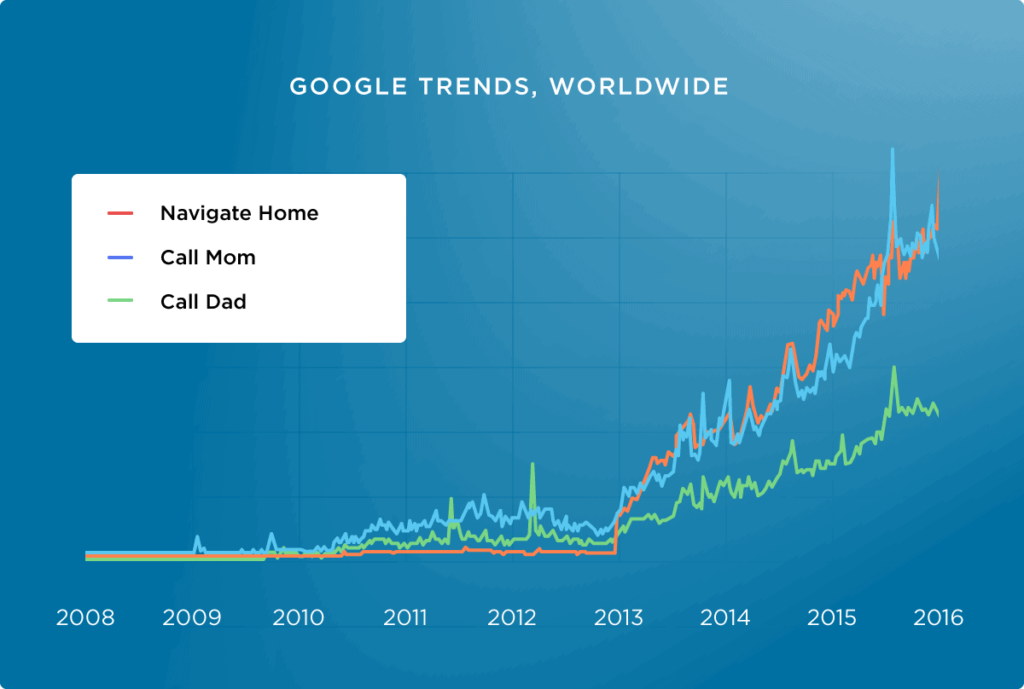
The statistics paint a clear picture:
Voice search is not “the next big thing”. It’s already here.
When you dig deeper, things get more interesting.
25% of all Windows 10 desktop searches are done via voice (Branded3).
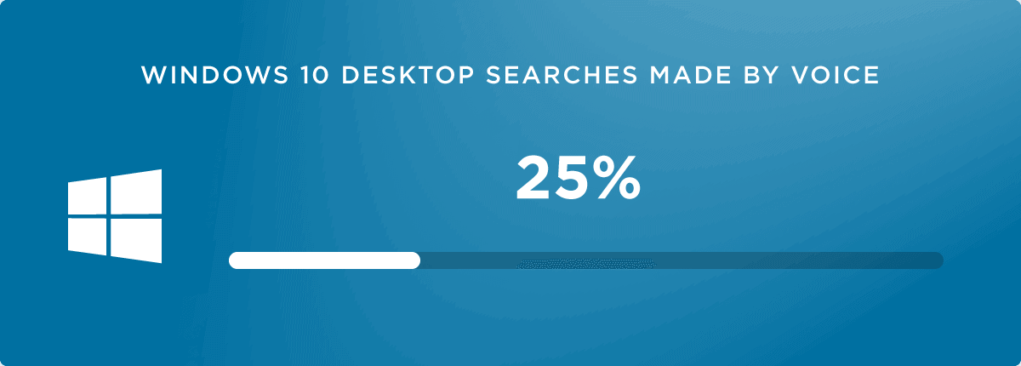
This figure surprises me.
Contrary to popular belief, voice search is not only applicable to mobile devices.
More and more people are using their desktop computers and smart speakers to talk. Speaking of…
65% of Google Home or Amazon echo owners “can’t imagine turning back” (geo-marketing).
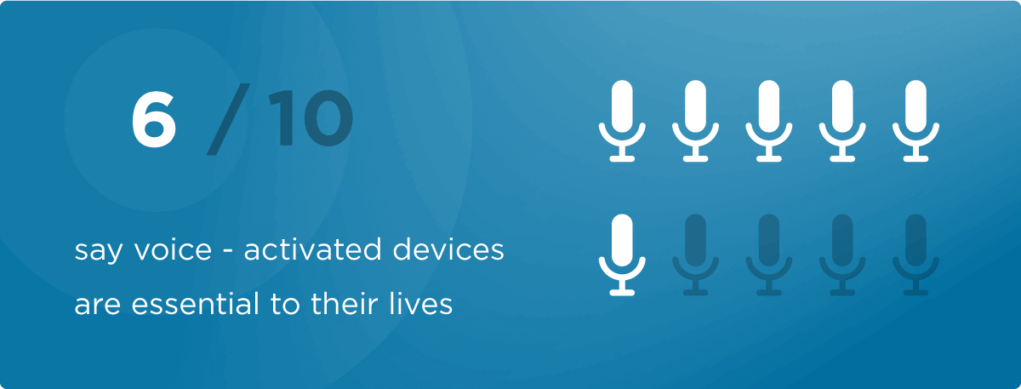
Smart speakers are the next refrigerator-every family will have one. As more and more people search using smart speakers, SEO will need to adapt (see Chapter 3 for more).
ComScore predicts that by 2020, 50 per cent of searches will be voice searches. No latest figures have been released, but a study shows that the number of smart speakers in the United States is close to 90 million. (voice robot)
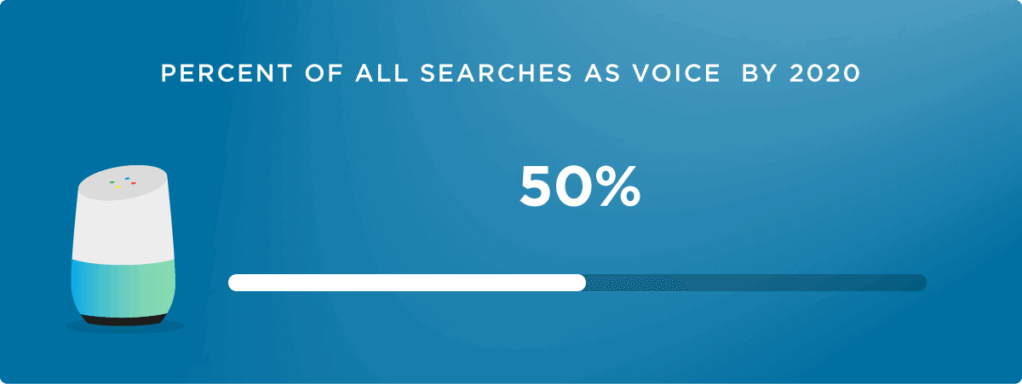
Who knows if this prediction will come true. Either way, it is clear that voice search is eating away at keyboard-based search.
As you will see soon, this trend will affect the way we optimize SEO content.
Now, you may be wondering:
Why is voice search growing so fast?
There are three main drivers behind this trend.
First, voice search is 3.7 times faster than typing (Bing).
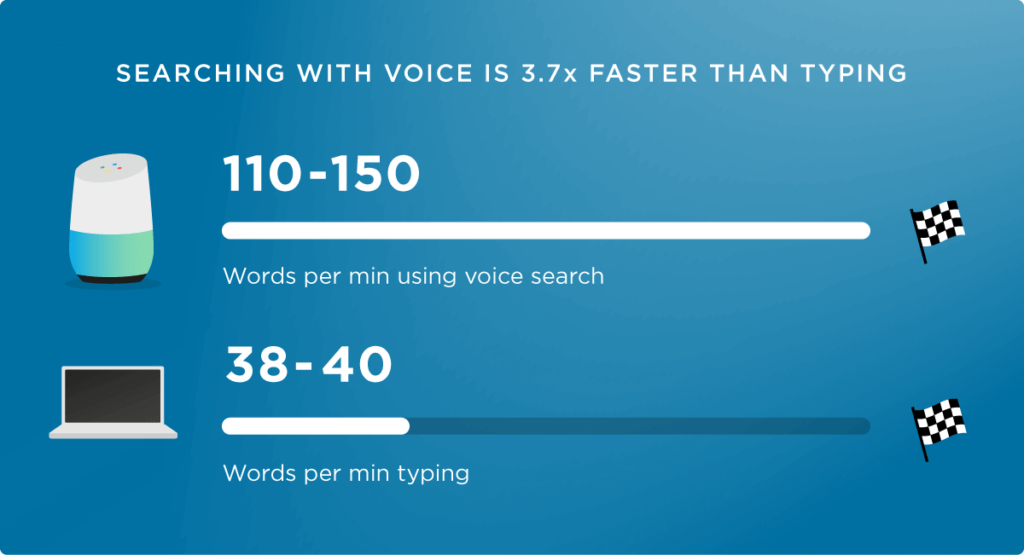
Faster search = faster answer.
So it’s not surprising that more and more people are using their voices instead of keyboards.
Second, voice is very suitable for mobile search. In fact, nearly 60 per cent of mobile searchers use voice search at least “sometimes” (Stone Temple).
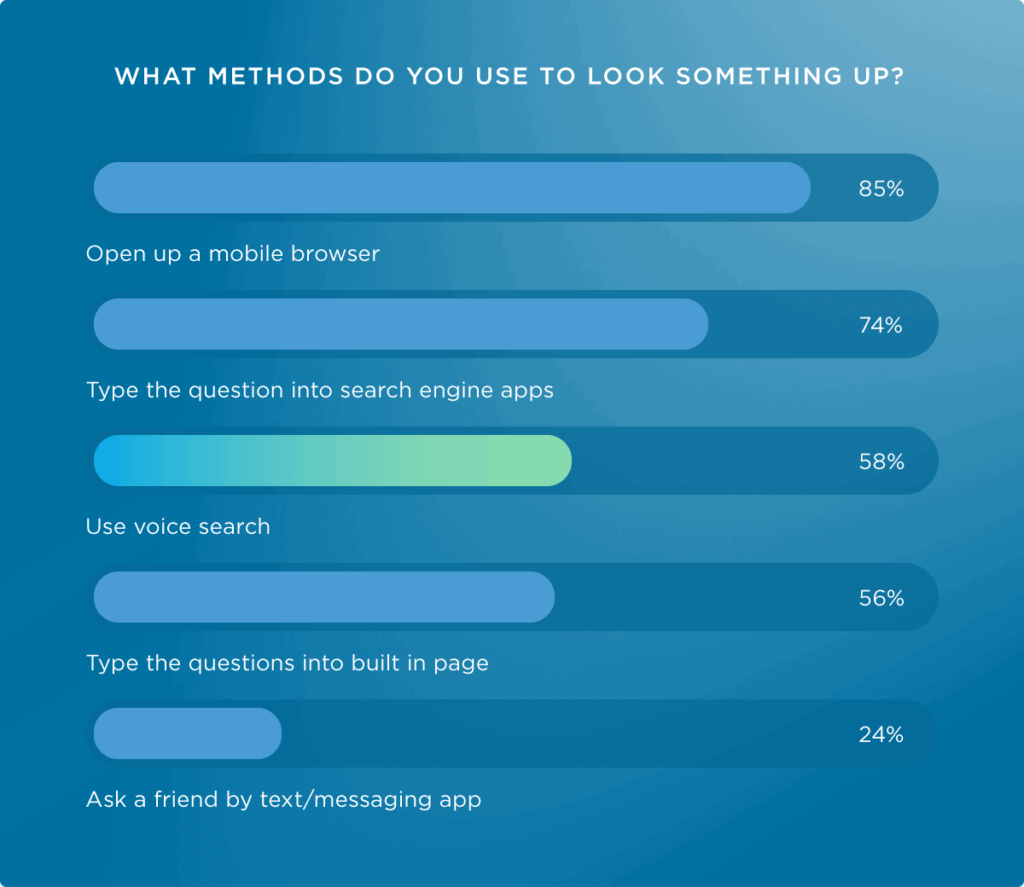
Finally, voice search is more convenient. This may be why more than half of the respondents in one survey said they used voice search, so they “don’t have to type” (Stone Temple).
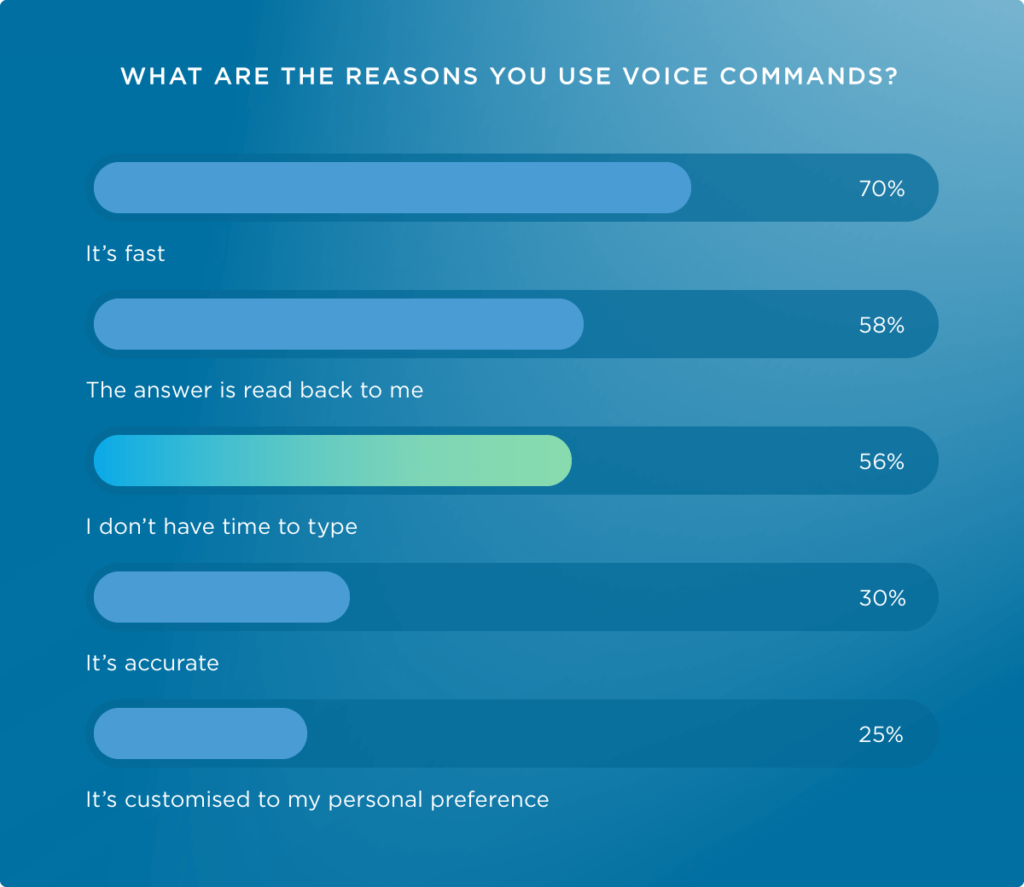
It is a great pain to enter “how tall is the tallest building in the world” on iPhone. But it’s absolutely easy to say the same phrase out loud.
To sum up:
Obviously, voice search is more than just hype. This is a legitimate trend.
This is a trend that has affected SEO.
Chapter 2: SEO in the World of Voice search
It turns out that searching with your voice is very different from typing.
Specifically, voice search has changed:
How people search.
When people search.
And what they’re looking for.
In this chapter, I will break down these changes. And how they affect SEO.
# 1: voice changes the way people search
Voice search has changed the way people search in two important ways:
- Search time is longer
- Search is more conversational.
I will explain…
Bing engineers have noticed that voice search keywords are much longer than text-based searches.

Voice search is not only longer… They are not like “computer language”.
In other words: they are more talkative.
(in fact, , Google says 70% of Google Assistant searches use “natural language.” )
For example, suppose you want to start making cold coffee at home.
A few years ago, you might have entered a short keyword in Google, such as “make cold brew”.

But when you use voice to search for the same thing, your query will be completely different.
Specifically, your search term will be longer. You will also use natural human language.

Needless to say, this has a great impact on how we conduct keyword research and page search engine optimization.
We will show you how to adapt to this change in chapters 3 and 4.
But now, let’s take a look at the second way that voice search changes SEO.
# 2: changes in the sound of people’s search
Because voice search is very convenient, it is used in more places than ever before.
In fact, Google reports that the number of searches for “_ near me” has increased by 150% in the past two years.

These searches take place in places you may not have thought of.
A survey found that compared with last year, people in public places (such as restaurants, gyms). Even public bathrooms) are significantly more likely to use voice search.
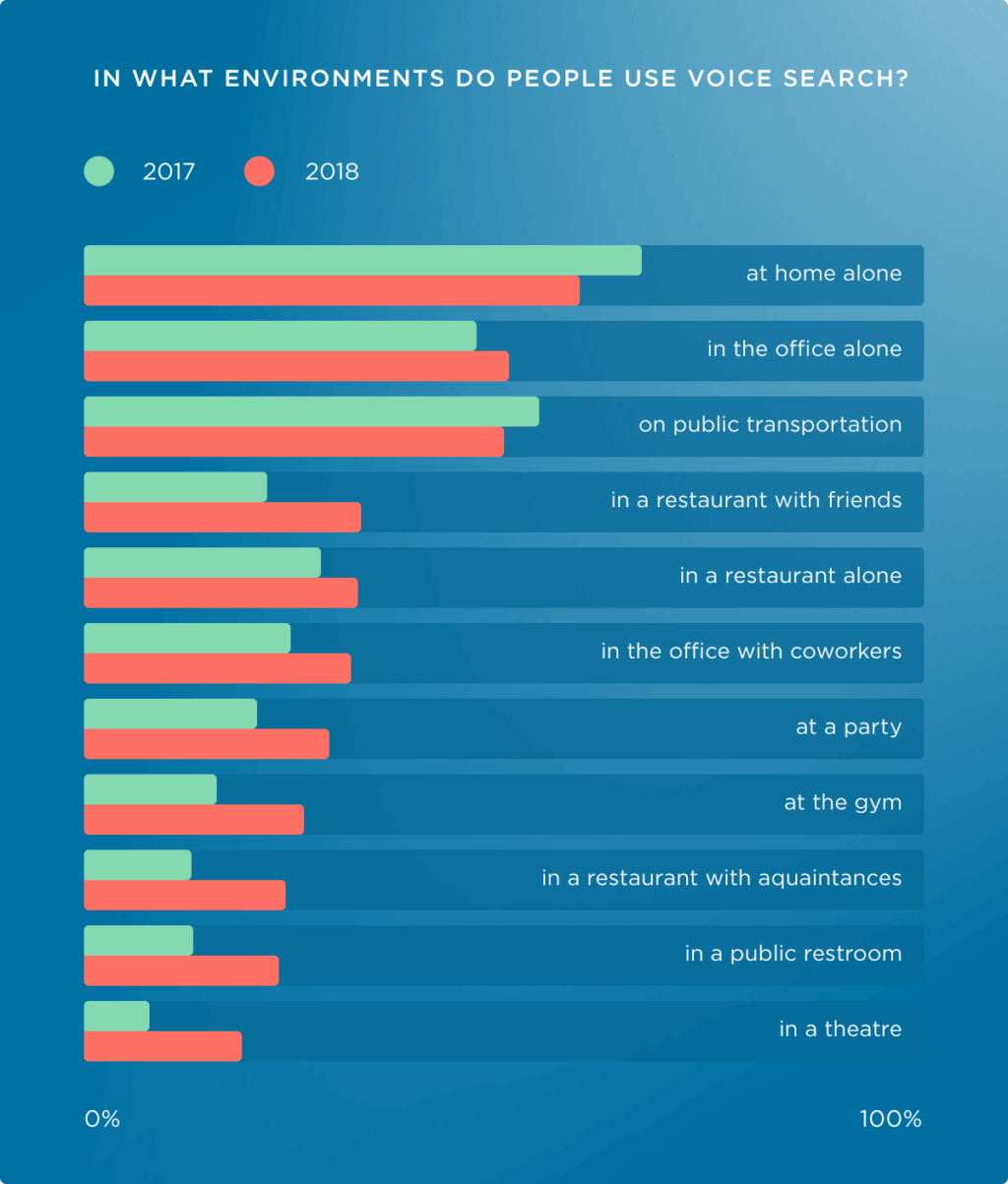
For example…
Suppose you are attending a big conference in Boston. On the way to the meeting, you spilled coffee on your shirt.
A few years ago, you would go to the nearest place with a Wi-Fi, take out your phone and type “Boston clothing store” in Google.

But thanks to LTE, location technology, and voice search, you can do voice search no matter where you are.

As I outlined earlier, the keywords you use will be very different from those you enter. )
# 3: voice changes the way people get search results
Google is slowly changing from a search engine to an “answer engine”.
In fact, the number of natural clicks has dropped by 37% due to SERP functions such as knowledge maps and selected clips.
Why? You don’t need to visit the website to get the answer. It’s in the search results.
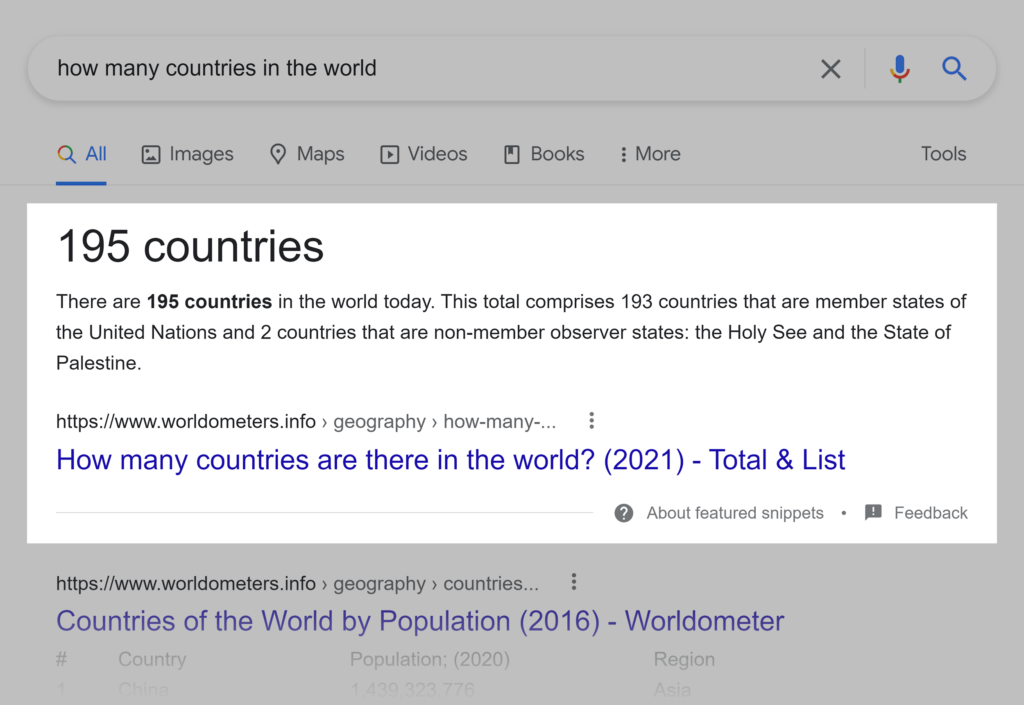
Google is also using the same answer-centric technology to provide voice search results.
For example, suppose you want to know how many calories there are in an apple.
In the past, you would search for “Apple calories” and so on. They were then forced to screen 10 different results.

But through voice search, you can read the answer to you in a few seconds.
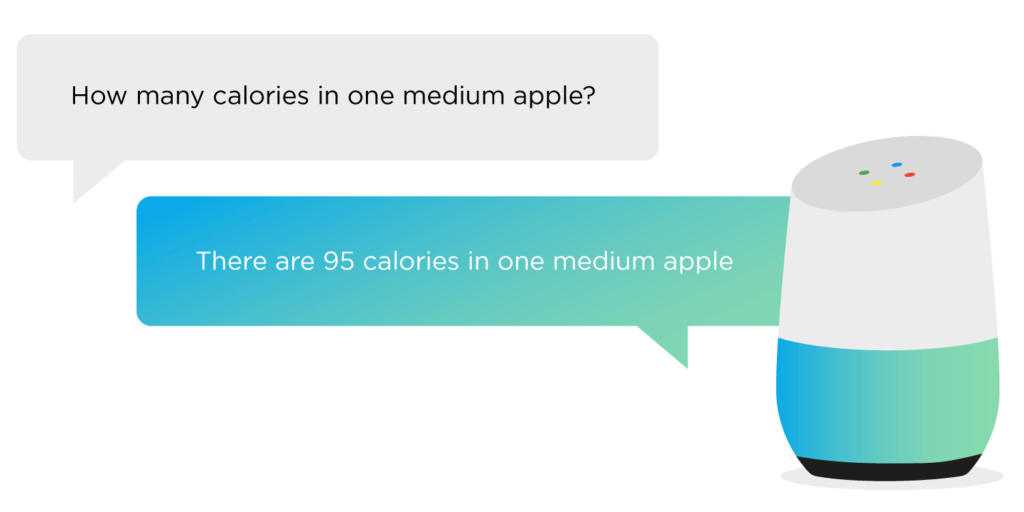
Of course, many voice searches are done on Google apps (or by “typing” with your voice on your phone).
This means that you can still get a traditional set of 10 blue links.
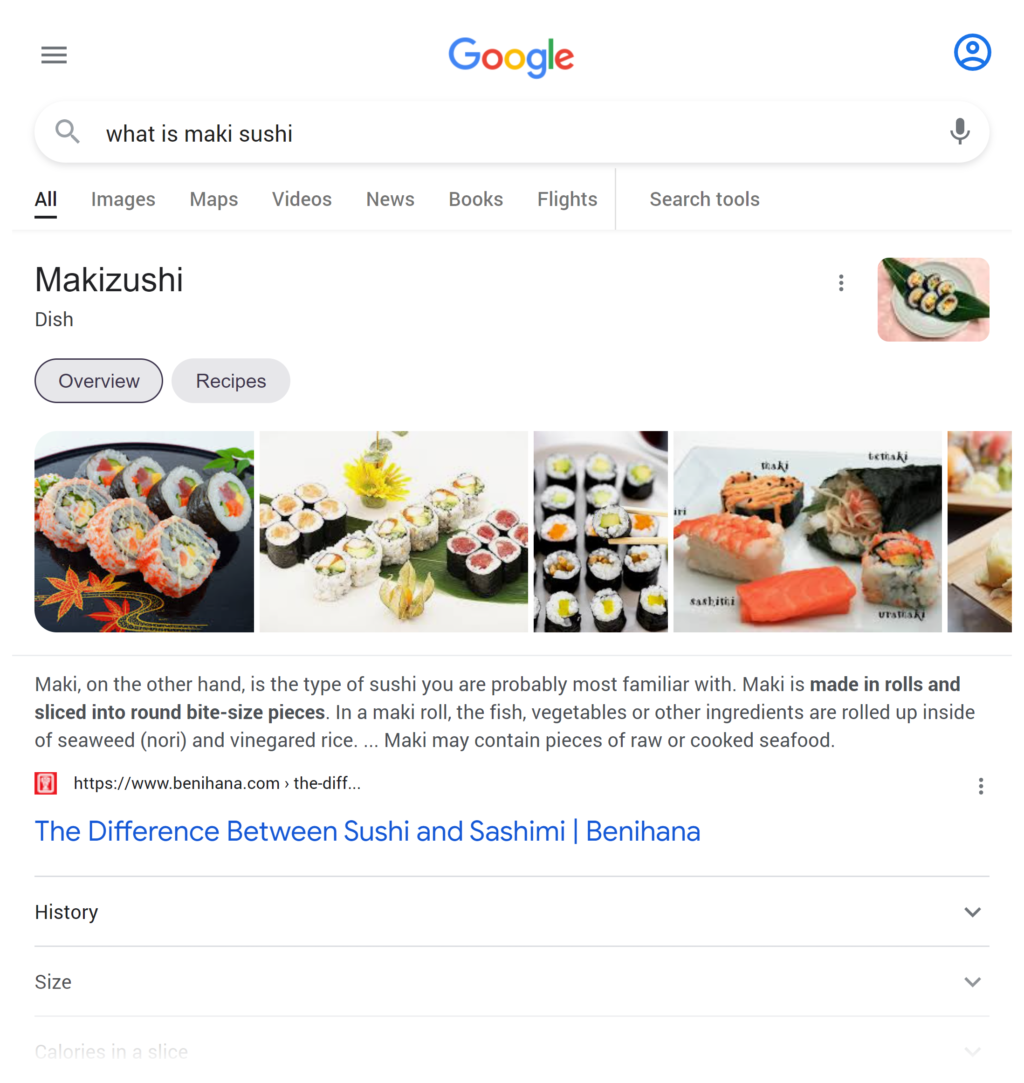
But this situation is becoming more and more rare.
In fact, even if you get 10 blue links from a voice search, Google usually reads selected clips to you.
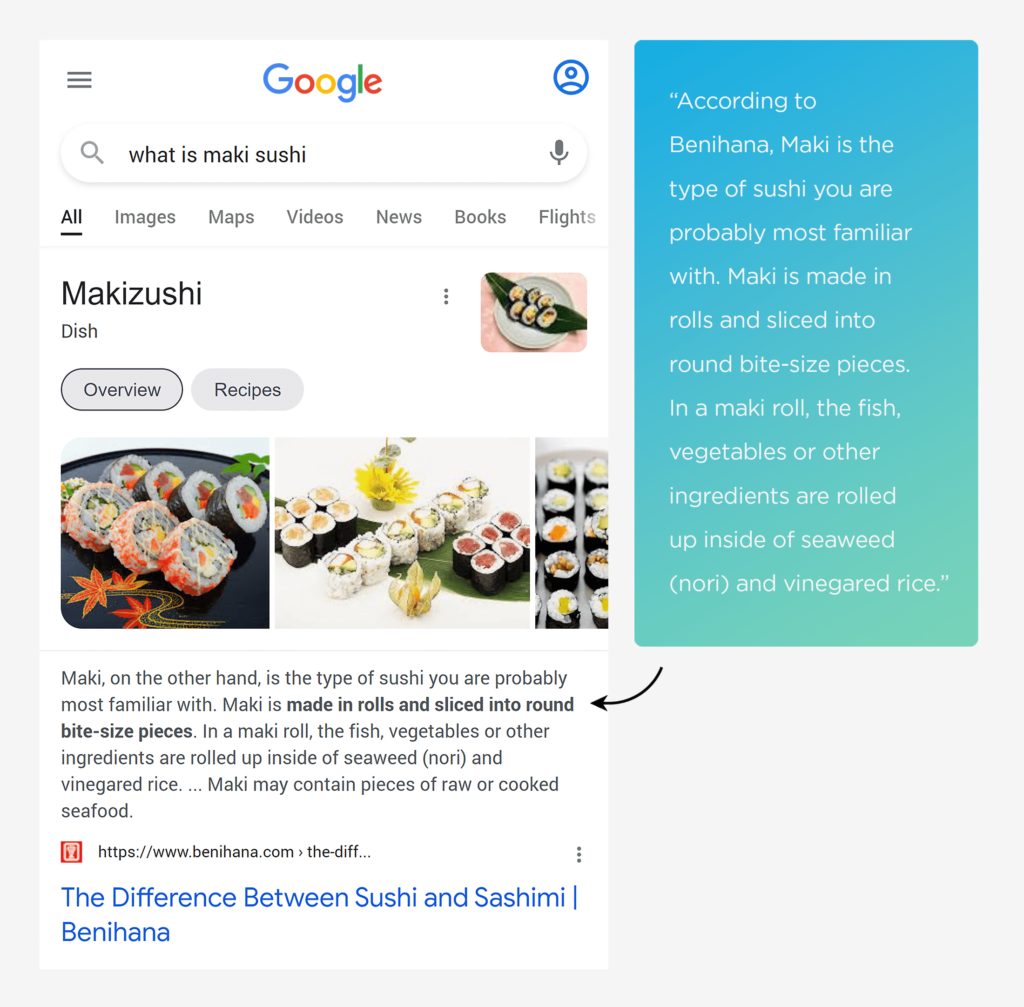
So: what does this mean for SEO and content creators?
Our content needs people to answer their questions directly.
Otherwise, it will become more and more difficult to present your content to people.
That is to say, don’t be nervous. I will show you exactly how to create voice-optimized content in chapters 4 and 5.
But first, it’s time to show you how to do keyword research that focuses on voice search.
Chapter 3: research on phonetic keywords
In this chapter, I’ll show you how to do keyword research in the world of voice search.
Specifically, I will provide you with three actionable strategies that you can use to find voice search keywords.
Let’s dive into the water.
Looking for the key words of “natural language”
As I mentioned in Chapter 2, voice search is more natural and conversational than text-based search.
So robot keywords like this…

… Is slowly being replaced by such keywords:

When you evaluate keywords, you need to keep this fact in mind.
For example, let’s get this set of results from Google Keyword Planner:
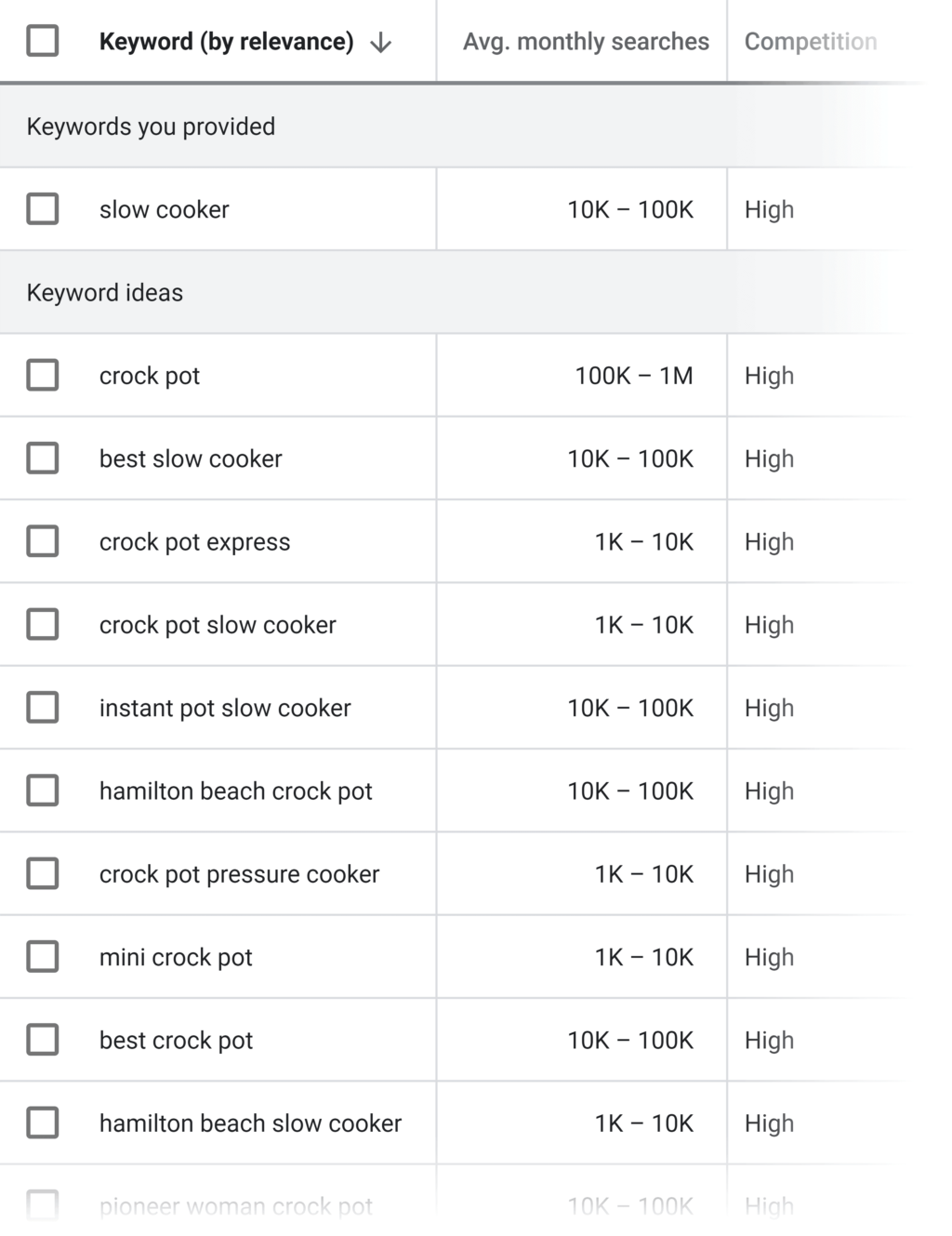
Most people only determine the size of this keyword list based on the following:
- Search volume
- Cost per click
- Seasonal trend
But because of voice search, you also want to check whether the keyword is conversational.
In other words:
With the growth of voice search, natural-sounding keywords will greatly increase the number of searches.
(and vice versa: if a keyword sounds mechanical, fewer people are expected to search for it in the next few years. )
Do not avoid overly long keywords
Most people avoid using long keywords altogether.
Why?
It’s simple: few people search for them.
But as more and more people use voice search, the keyword “normal” is getting longer and longer:
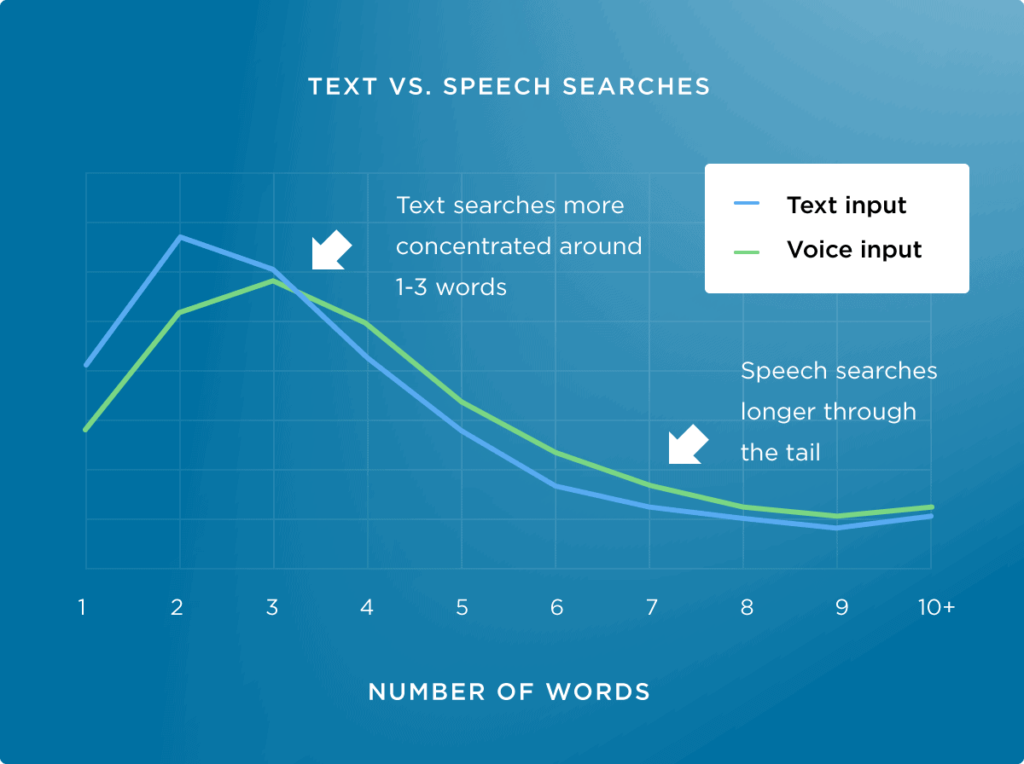
So don’t be afraid to optimize your content around more than 5 words, such as:

Now, be clear:
I don’t think you should optimize the entire page for a long time.
Instead, you want to add these long keywords to your content.
As you will see in Chapter 4, if Google finds a keyword anywhere in a paragraph, they will use it as a voice search result.

Locate “problem keywords”
To a large extent, thanks to voice search, problem keywords increased by 61% year-on-year:
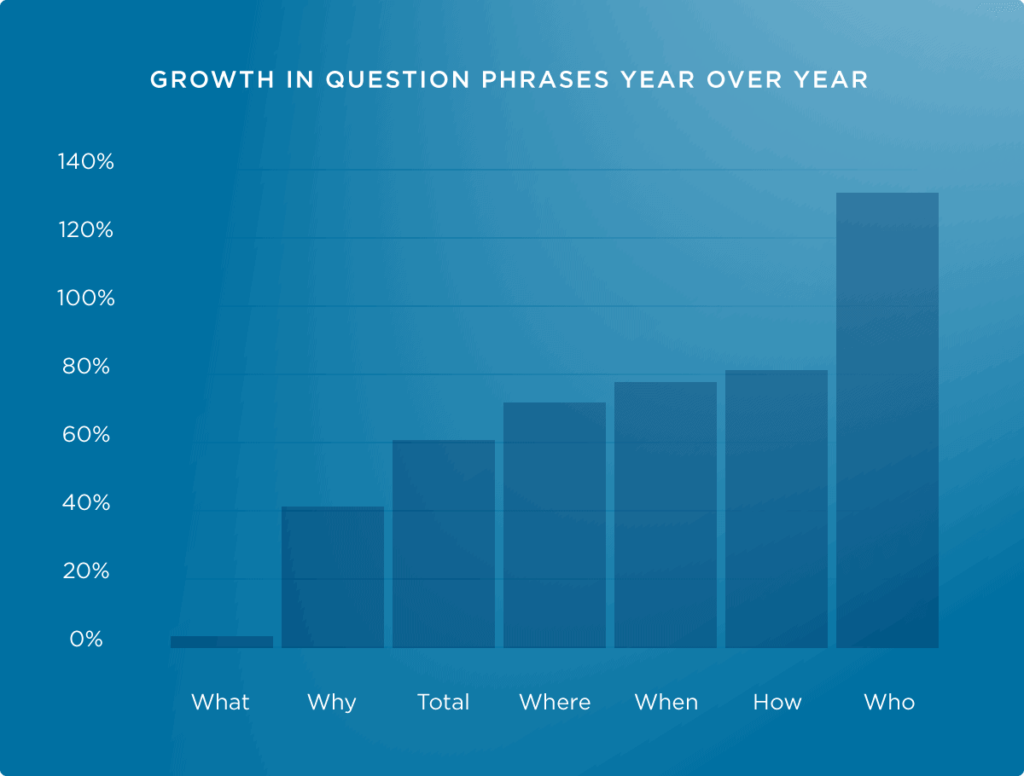
A few years ago, if you wanted to get a higher ranking in Google, you might have searched for something like this:

But you may not take out your iPhone and say, “Hey, Google. Search engine optimization.
Instead, when you search by voice, you ask a question.

You can already find problem keywords in any keyword research tool:
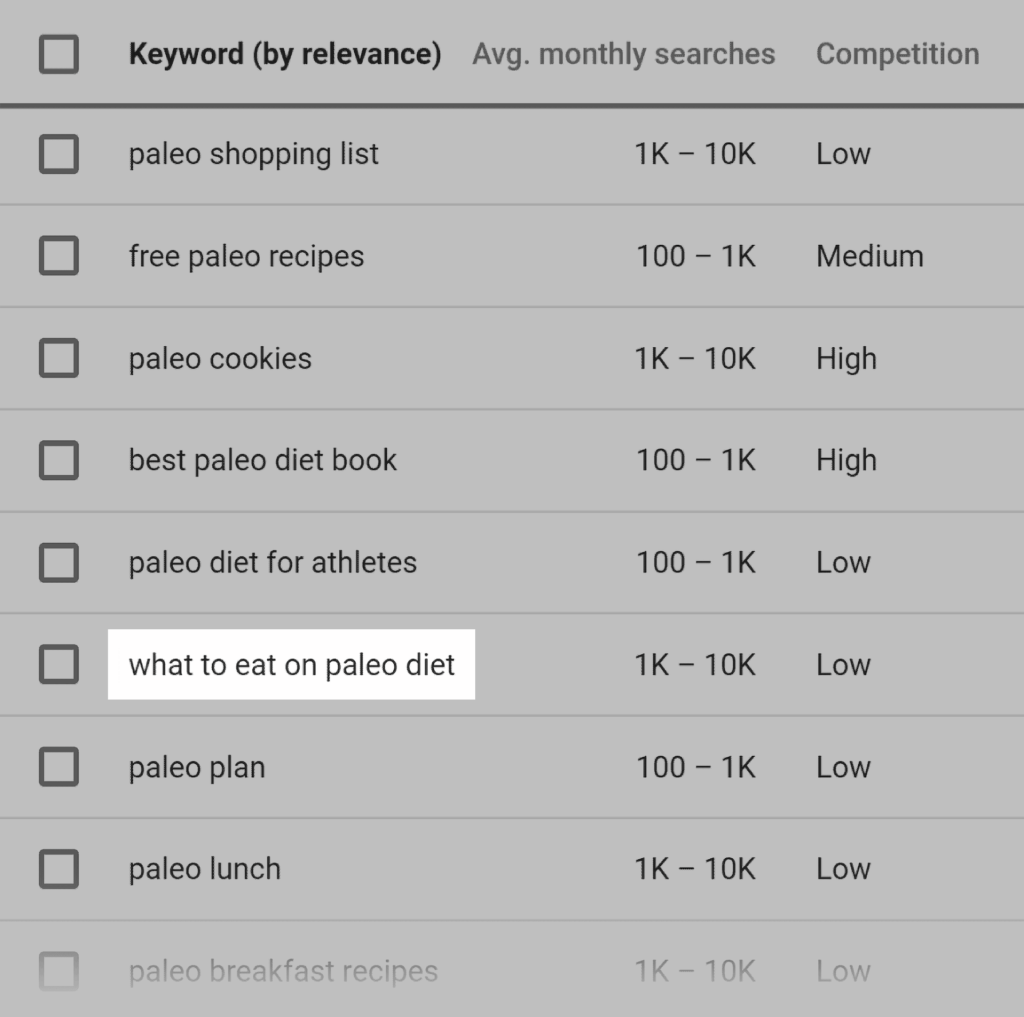
But it takes a lot of digging.
If you want to extend this process, I suggest that AnswerThePublic…
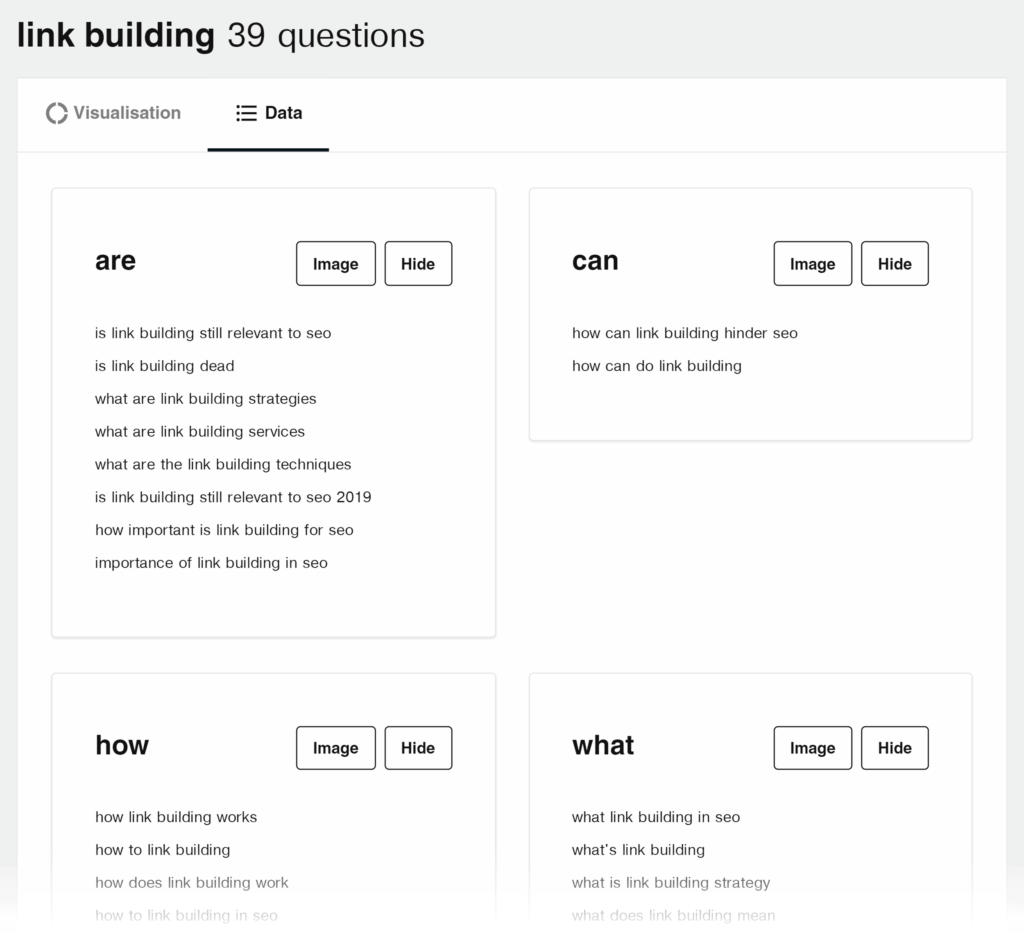
… And BuzzSumo’s content discovery:
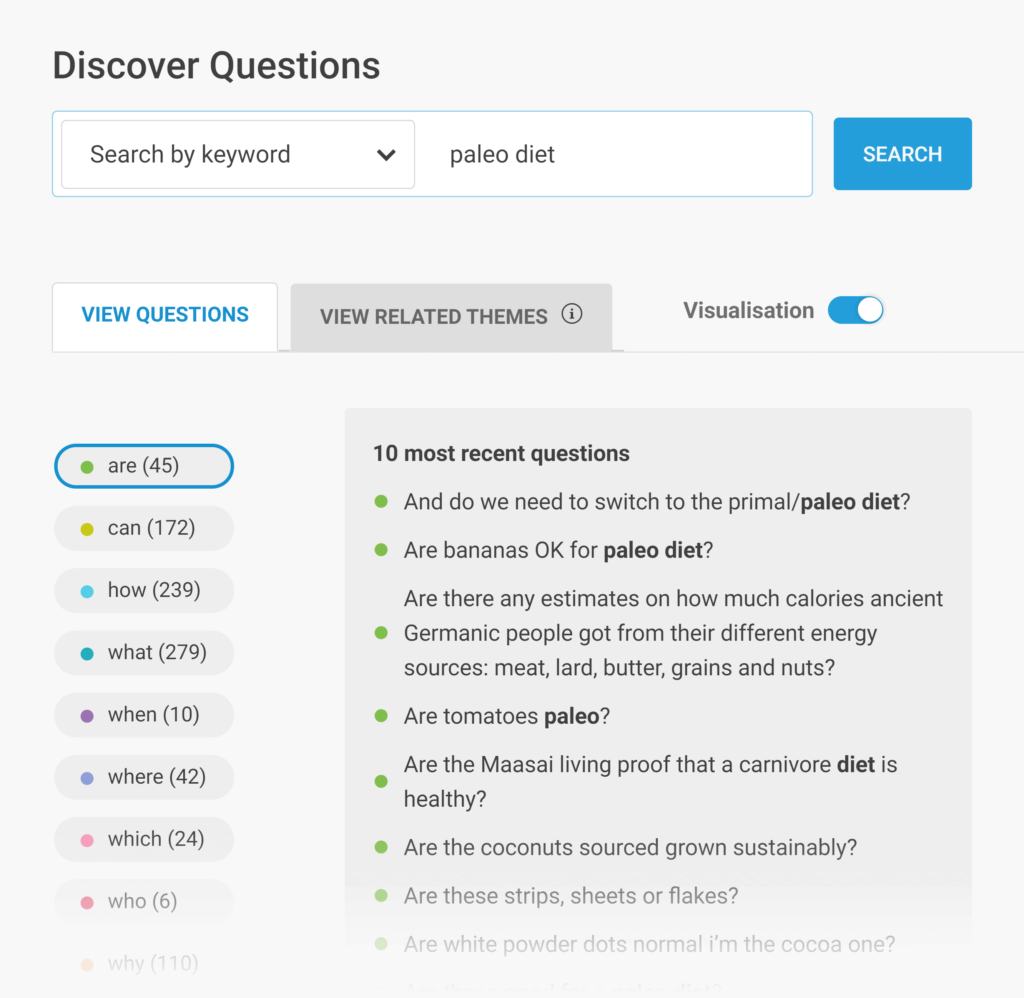
Now that you’ve found some voice search keywords, it’s time to optimize your content around them.
Chapter 4: optimize the content of voice search
In this chapter, you will learn how to optimize the content of your voice search.
I have some good news:
You do not need to thoroughly check your website.
In fact, you can make some simple adjustments to prepare your site for voice search SEO.
Include short, concise answers in your content
A few years ago, we conducted the largest voice search SEO ranking factor study ever.

One of our most interesting findings is that Google tends to answer voice search queries with short 29-word results:

For example, the Google Home result of the query “are figs good for you” is:

(the result is 28 words. )
This is why it is important for your content to answer someone’s query with 30 words or less.
Then say:
There is no point in writing a 30-word blog post.
That’s why you want to.
Create a voice search FAQ page
The FAQ page is ideal for voice search.
Why?
Well, as I mentioned earlier, problem keywords are on the rise.
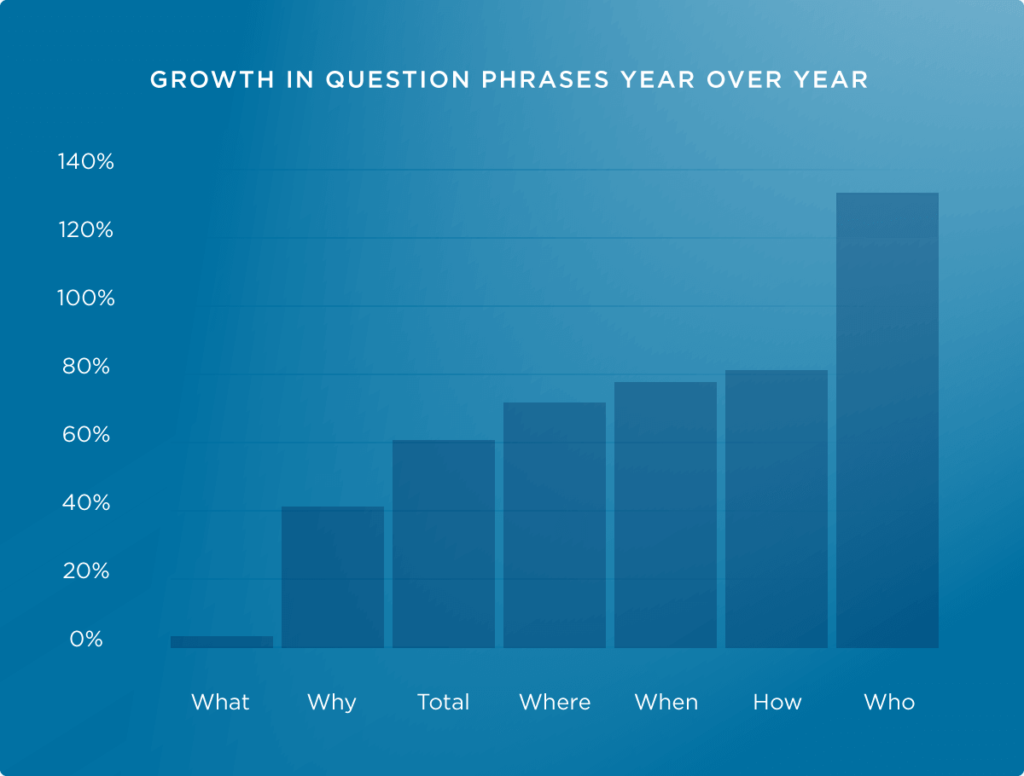
You just learned that Google wants to give their users an answer of about 30 words.
The FAQ page checks these two boxes.
This may be why voice search results are 1.7 times more likely to come from FAQ pages than desktop search results.

For example, if you do a voice search for “how car insurance claims work”, you will get the following results:

Sure enough, Google extracted this answer from a FAQ page:

It’s just a keyword. FAQ pages can rank hundreds of different voice search queries.
For example:
If you do a voice search for “how Family Insurance claims work”, the results come from the same FAQ page.

Optimize for selected clips
Entering a selected segment is like a voice search for a cheating code.
In fact, 40.7% of voice search answers come from selected clips:
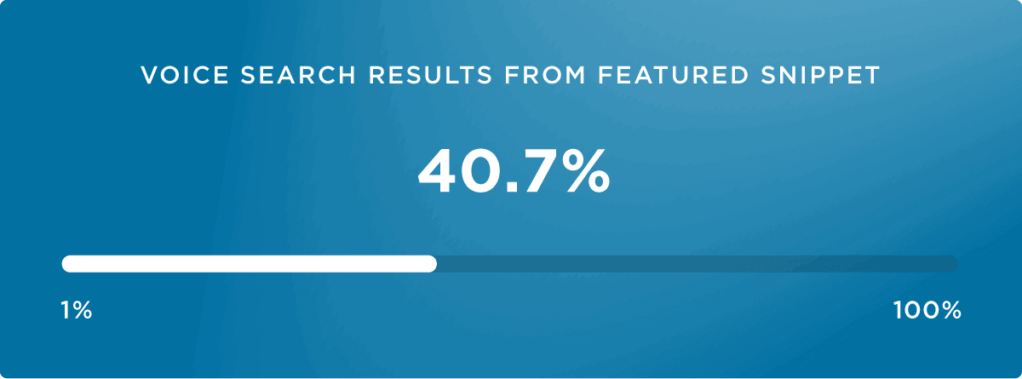
For example, if you do a voice search for “is ice water harmful to dogs?” Using the Google iPhone application, the answer you get is:
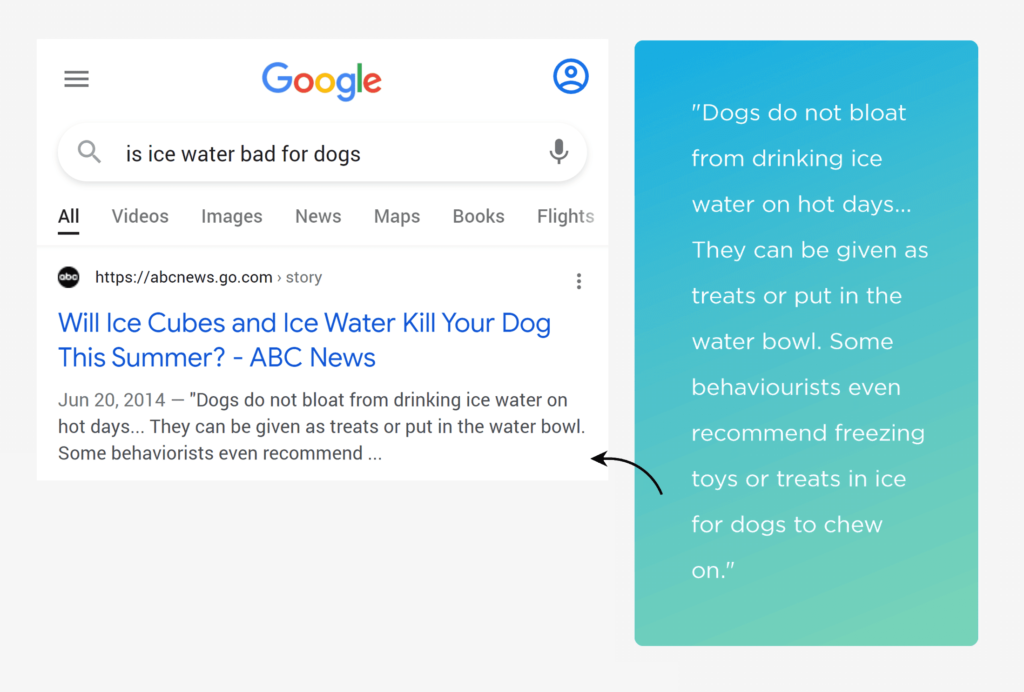
If you look at the search results, you will find that Google only reads the first result.
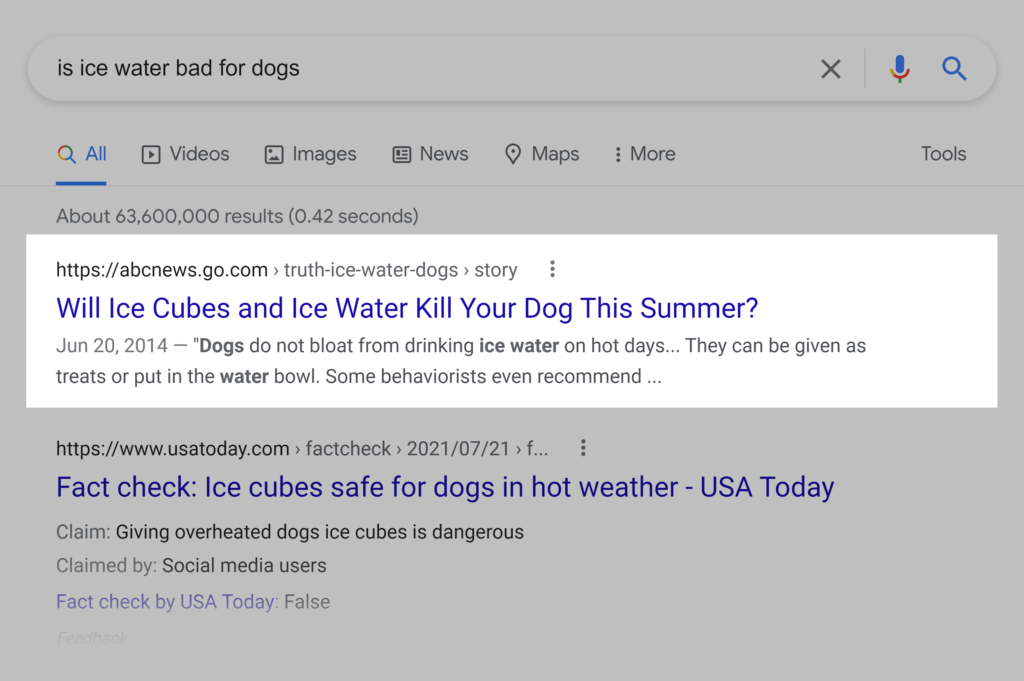
Keep this in mind:
Getting into selected segments is more important for Google Home and Alexa search results.
Why?
These devices only give you one answer.
Therefore, if you are not ranked in selected clips, you will not be visible on these devices.
Write content in natural language
Compared with keyboard search, voice search is more natural and less mechanized.
And you want to write content in the same way.
In this way, when someone searches…

… Google will find a “match” in your content:

(if you use a robot phrase such as “how to dm on Instagram”, no match will occur. )
Embed long-tailed keywords into long content
Yes, voice search is much longer than keyboard search.
But that doesn’t mean you need to create 1000 pages optimized for 1000 different voice search terms.
In fact, one of the most surprising findings of our voice search ranking factor study is that less than 2% of voice search results contain exact keywords in their title tags:

Instead, Google will extract the answer from the page.
… Even if the answer is only a small part of the content.
For example, I just did a voice search on “whether the post office accepts credit cards or not”.

The result comes from a page that answers the question only in the middle of the page:

But because the answer is short and sweet, Google thinks this is the best result of the query.
Embed a large number of long-tailed keywords in your content. When you do this, your single page can rank for many different voice search queries.
Chapter 5: advanced skills and Strategies
This chapter is about teaching you advanced voice search SEO skills and strategies.
Therefore, if you want to “go all out” to do a voice search, you will like the feasible suggestions in this chapter.
Let’s get started.
Include the word “fill” in the question keywords
You have learned that problem keywords are on the rise.
(mainly due to the increase in voice search. )
When you optimize for the problem, be sure to include “filler words”.
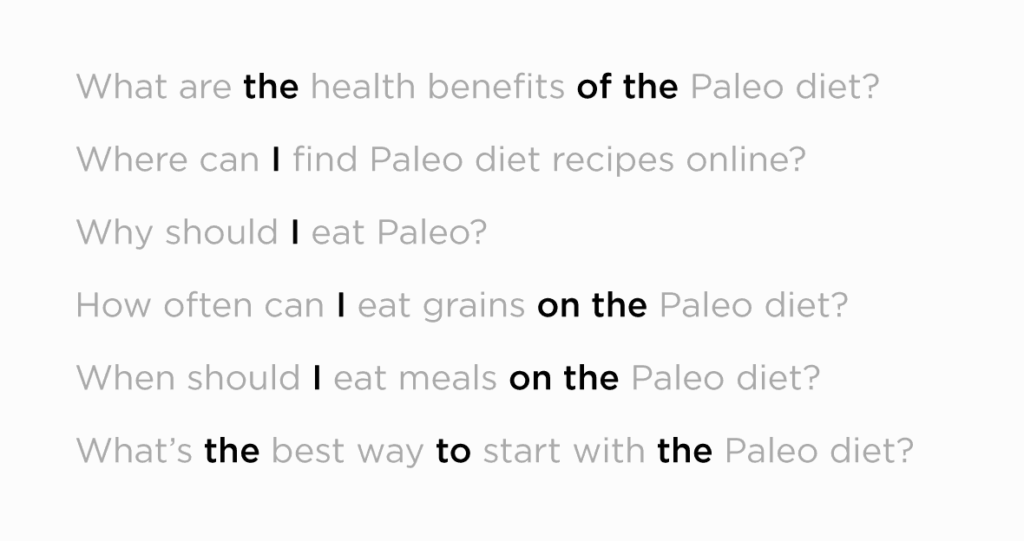
Why?
Well, Bing’s Purna Virji pointed out:
The more matches you have, the more likely your ad will be displayed in a voice search that includes the words “a”, “me” and “for”.
Write for Grade 9 reading level (or below)
The average voice search results are about the reading level of the ninth grade.

This means that you should avoid using jargon and fancy words in your content.
To tell you the truth, you should avoid these things anyway. But it’s nice to know that clear writing also helps you with your voice search rankings. )
Increase your site speed
The loading speed of voice search results is 3.8 times faster than that of ordinary websites.
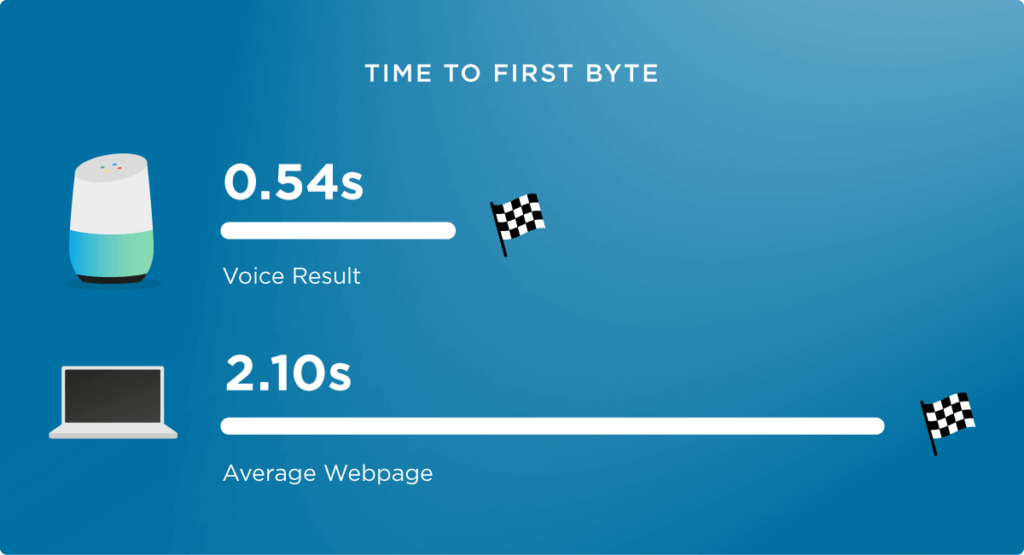
Again, in any case, you want to have a website that loads quickly.
(especially considering that Google’s Speed Update is now online. )
This leads us to.
Strengthen your domain name weight
Did you know that websites with many links rank higher in voice search?
It’s true.
In fact, the average Domain Rating of voice search results is close to 77.

This is very high. )
And unlike the traditional SEO, the authority of the page does not seem to be an important voice search ranking signal.

This data comes from our voice search relevance research. Therefore, it is impossible to know exactly what happened using only our data.
But my theory goes like this:
Many voice searches for “results” are actually just one result.
Google needs to know that the answers they give you come from reliable sources.
(in other words, a domain with a lot of trust and authority. )
Therefore, they rely on domain name weights rather than page weights.
For example, this is an Google Home voice search:

The answer comes from the authoritative domain name (speedtest.net).
But the page weight of the page itself is very low (13).
The bottom line is this:
If you want to rank in voice search, please focus on building your domain name weight.
When you do this, Google will want to use your website as a source. Even from pages on your site that do not have a large number of links.
Longer content = more voice search traffic
You may have heard that the average number of words on the front page of Google results is about 1447 words:
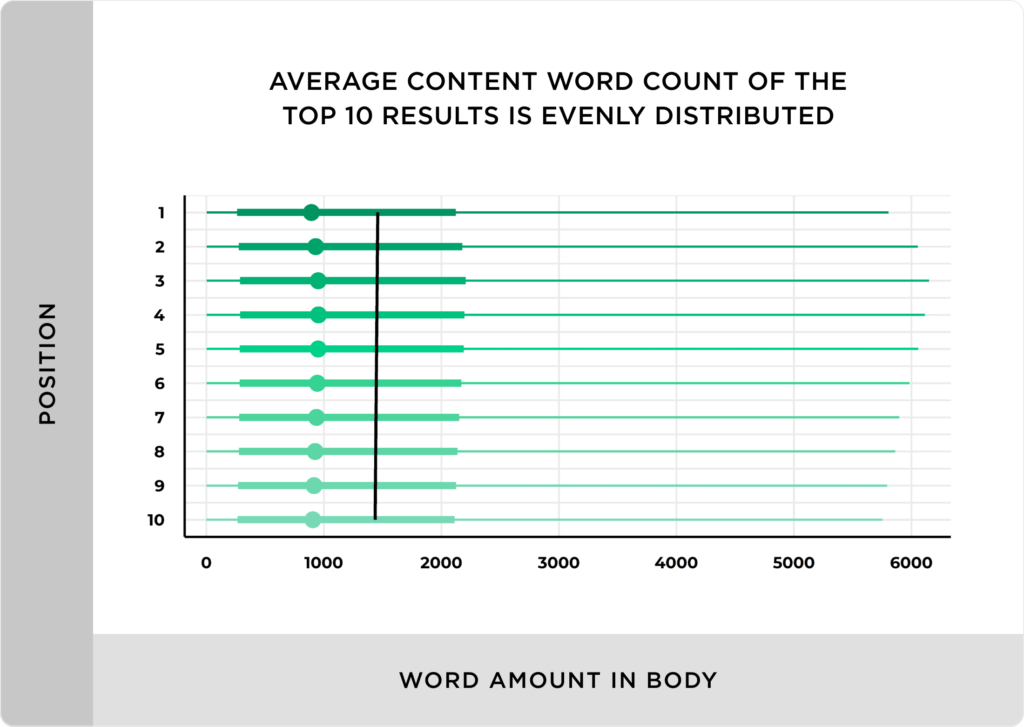
What you may not know is that voice search results pages tend to be longer (2300 words).

Be clear:
I don’t think Google’s voice algorithm is suitable for long content.
Instead, it’s just a numbers game:
Pages that contain a lot of content are more likely to “match” voice search queries.

Optimize the search for “nearest to me”
In the past, “local” search meant cities and states.
So if you want to find a dry cleaner in New York, you can Google:
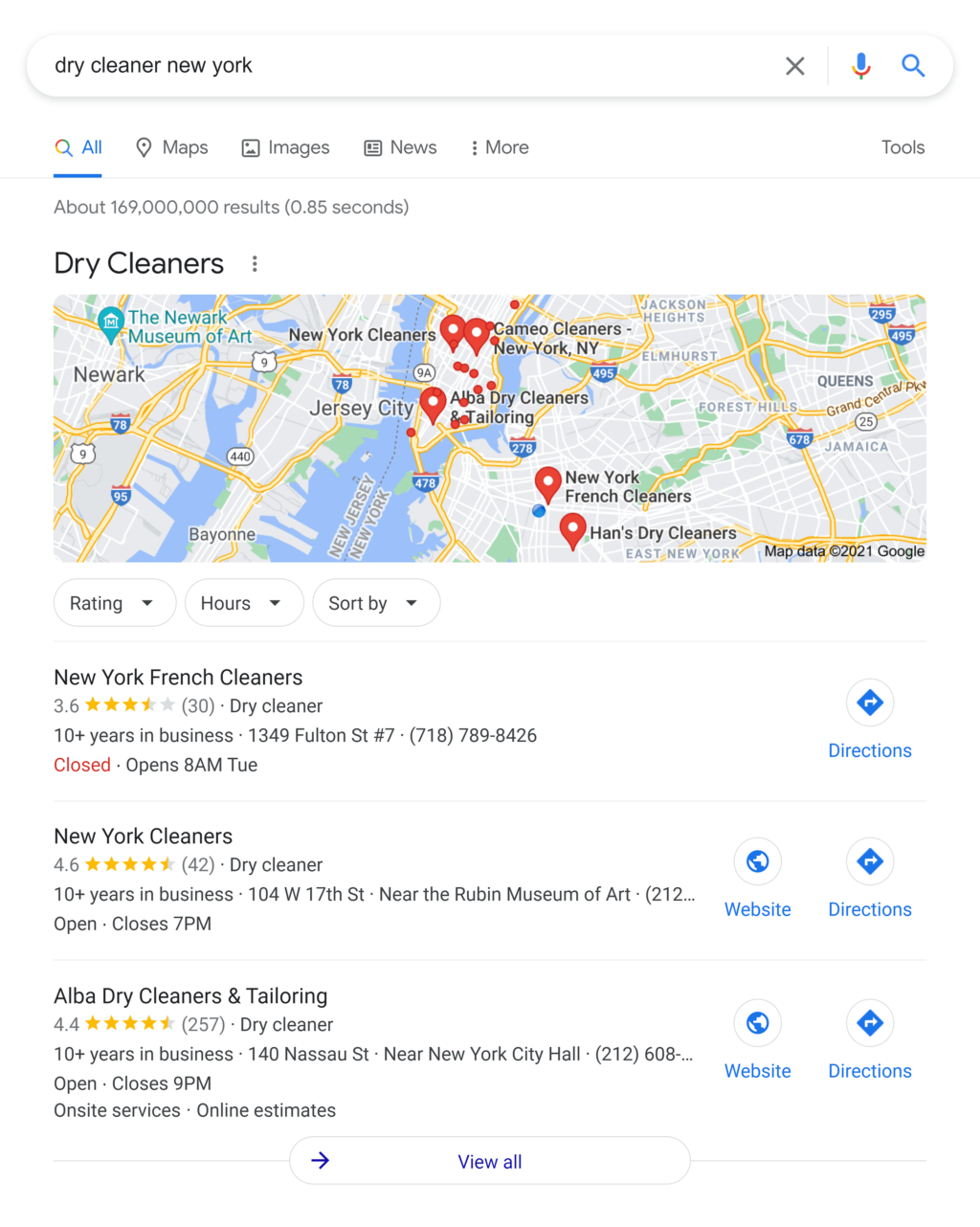
In the past few years, local search has gone from “city”. Became a “block”.
(mainly due to the explosive growth of the search for “nearest to me”. )
Therefore, if you run a local business, you need to optimize around the terms used by voice searchers.
For example, I was looking for a salad shop the other day. I happen to be near Fenway Stadium.
So I used the Google app to search for “salad near Fenway”.
I got a list of salad shops near Fenway Stadium:
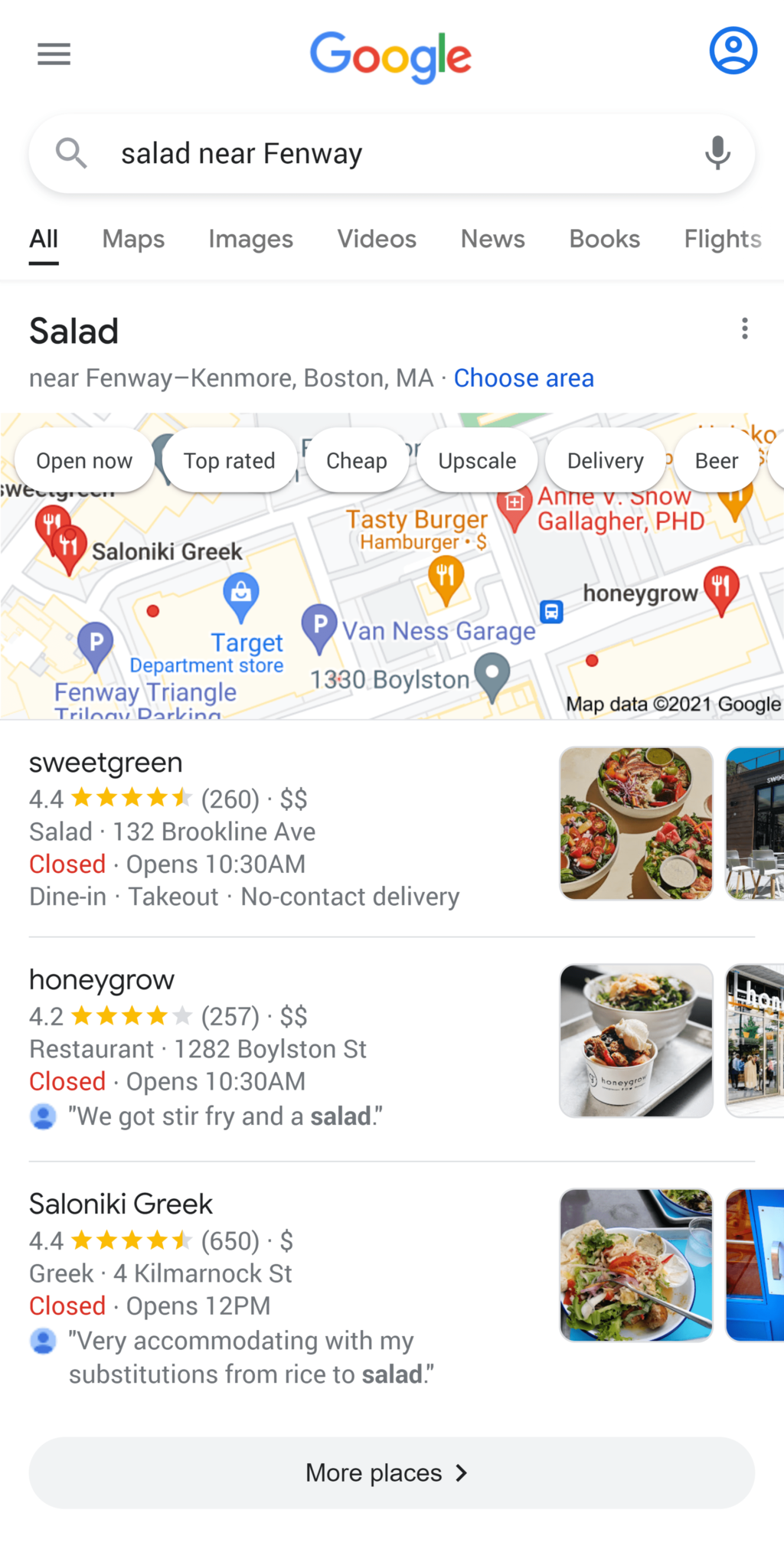
Companies optimized for “near Fenway” or “Fenway region” will rank best in such hyperlocal searches.
This means that more customers walk in the door. )
Rank videos in search results
You may have noticed that Google recently launched what I call “selected video clips”.
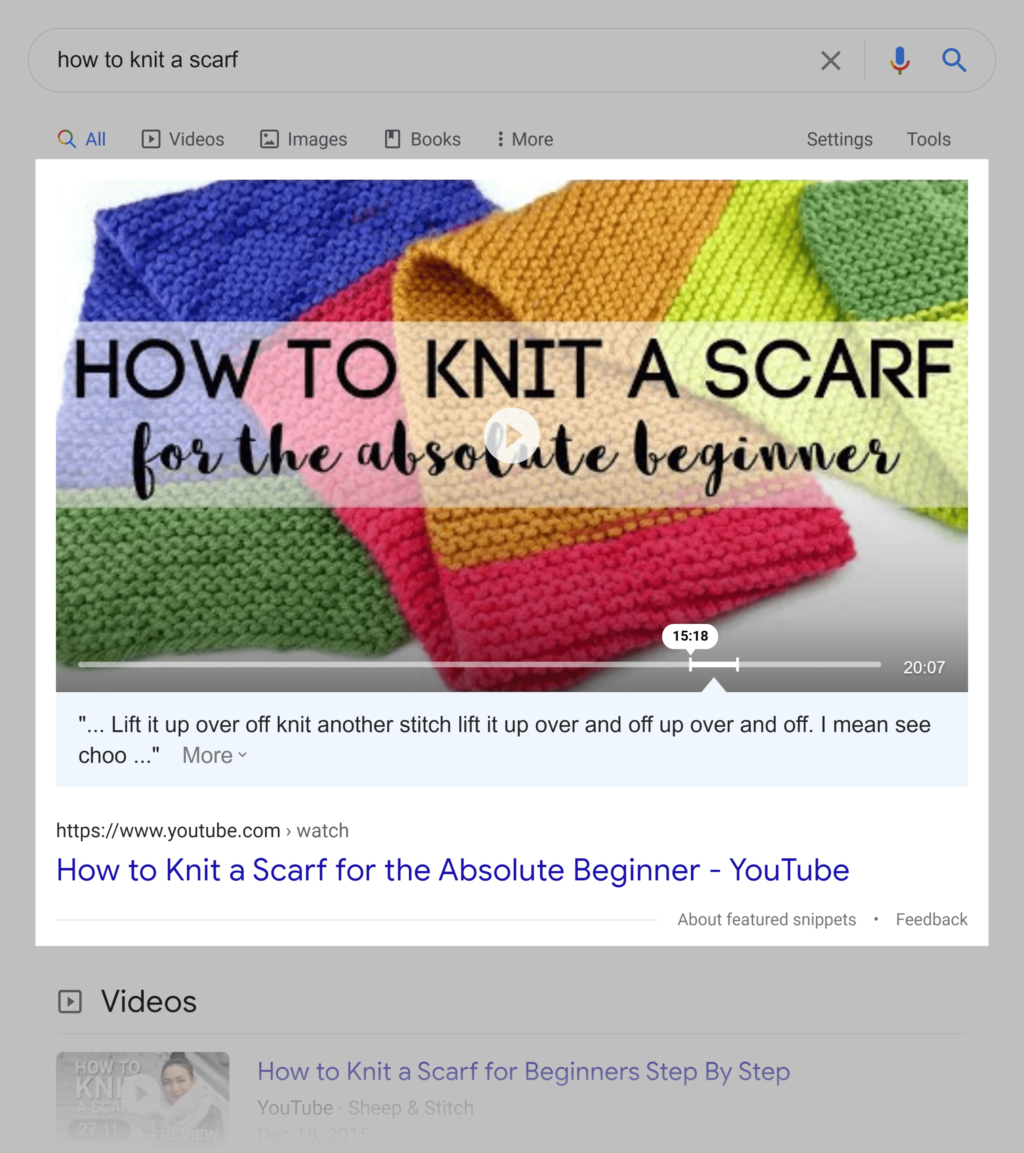
As you can see, this is a video result.
However, Google extracts the portion of the video that is relevant to your search, rather than a link to the YouTube video.
According to my informal tests (and data from Bing), these types of video results tend to appear more frequently in natural language queries.
(the type of natural language query that people use in voice search. )
This is a perfect example of what I mean.
Suppose you want to rank videos on YouTube. Therefore, you decide to search for some video SEO suggestions.
If you use a keyboard, you may search for the following:

Of course, there are videos in the search results. But they rank close to the middle of the page.
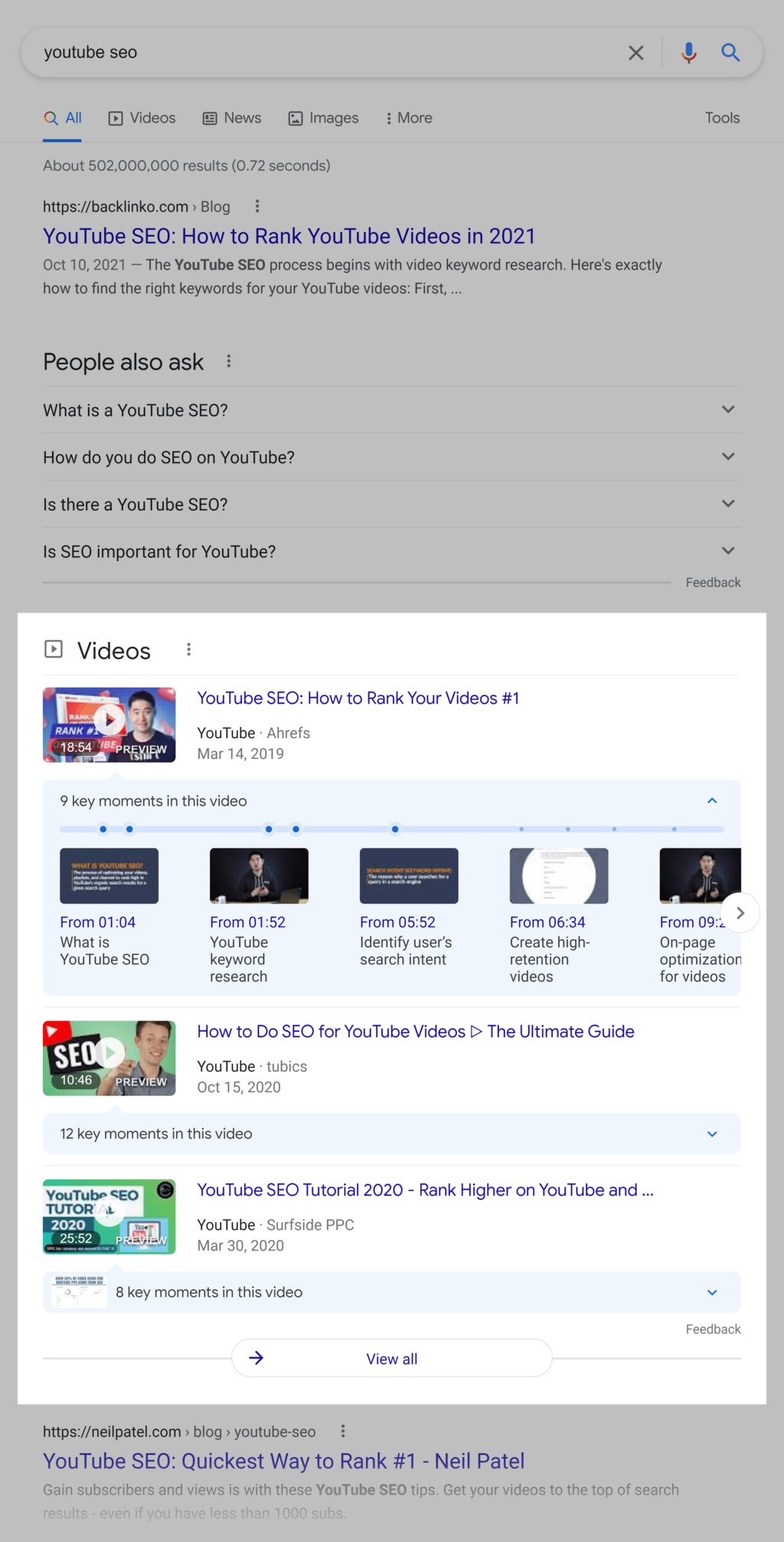
See what happens when you use natural language keywords to search for the same content: “how to rank youtube videos”
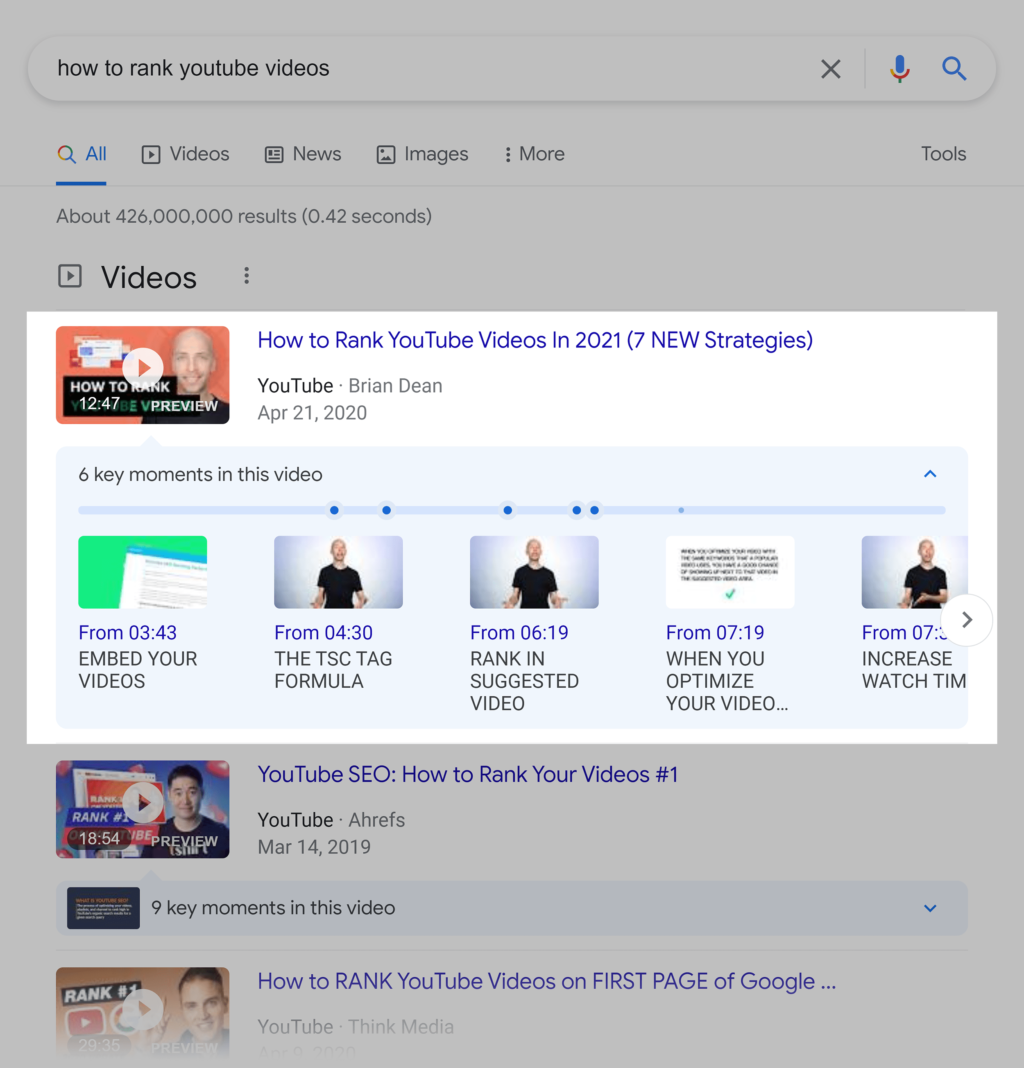
You’ll get a video result.
Takeout goes like this:
Video is an important part of Google’s strategy to answer voice search queries.
Therefore, if you want to present your content in front of voice searchers, you need to rank your videos in Google.
Chapter 6: voice search SEO case study
In this chapter, you will see real examples of voice search results.
I will also break down each page so that you can understand why it ranks so well.
In this way, you can apply these policies to your website.
Case study # 1: “what are channel keywords?”
Not long ago, Backlinkco launched the YouTube Marketing Center.

When Backlinkco writes content centrally, be sure to optimize it for voice search.
Specifically, I include a mini FAQ section at the top of almost every page:
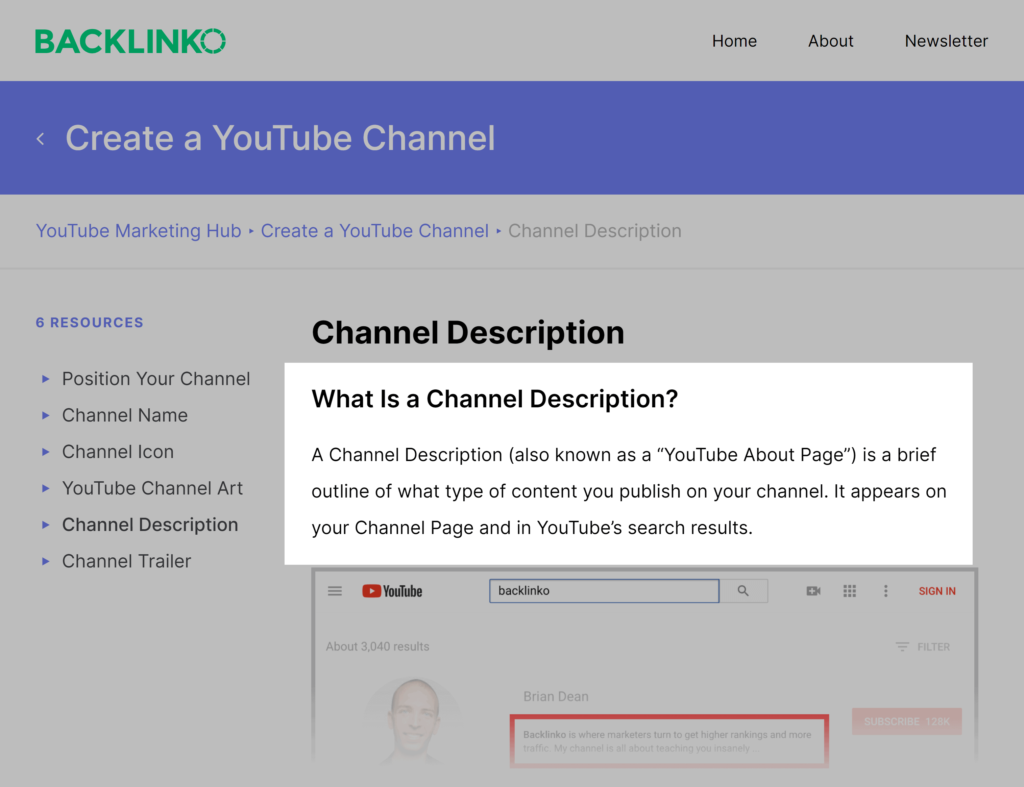
It worked!
When you describe “what is the YouTube channel?” When you conduct a voice search, you will get the following answers from Google:

Let’s break down some of the factors that led to this result:
First, the answer is part of the mini FAQ section. As I showed you earlier, Google likes to extract voice search answers from the FAQ page.
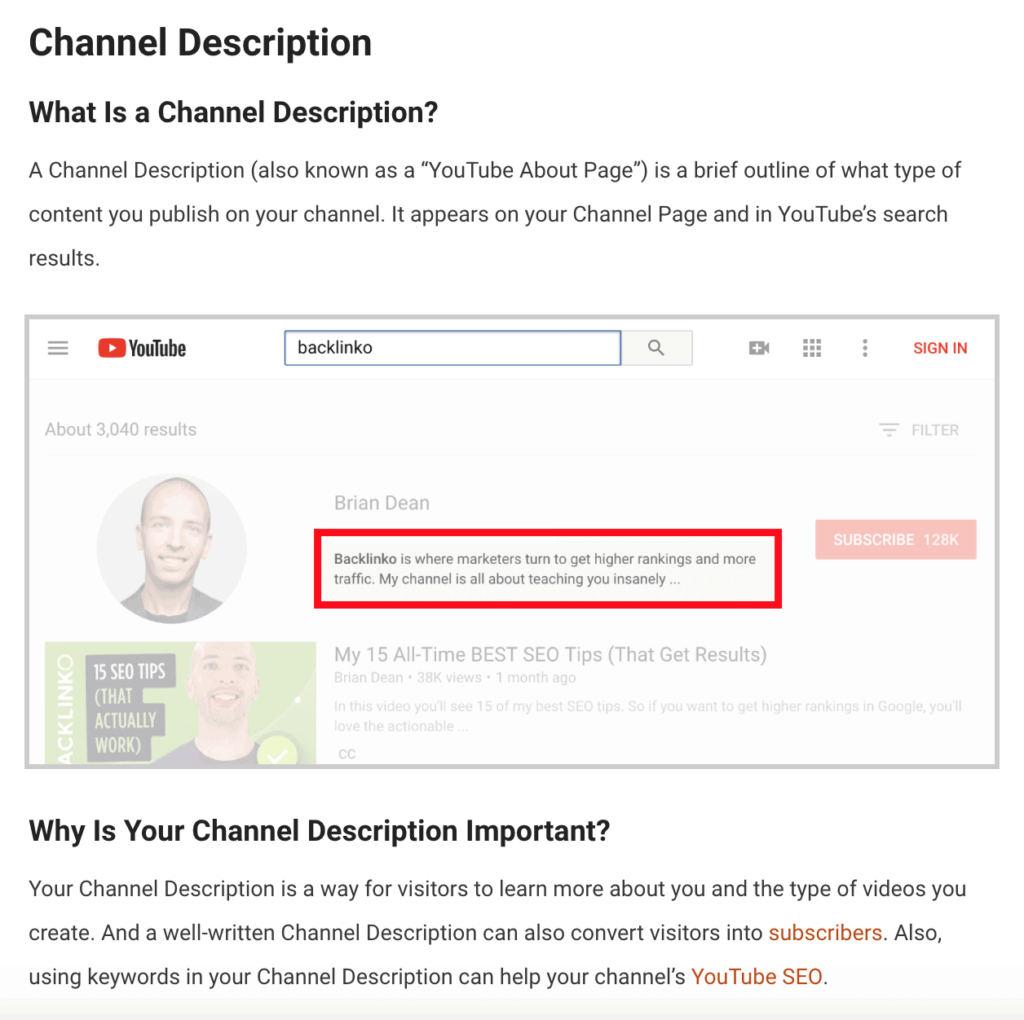
Next, the results are displayed in the Featured Snippet point:
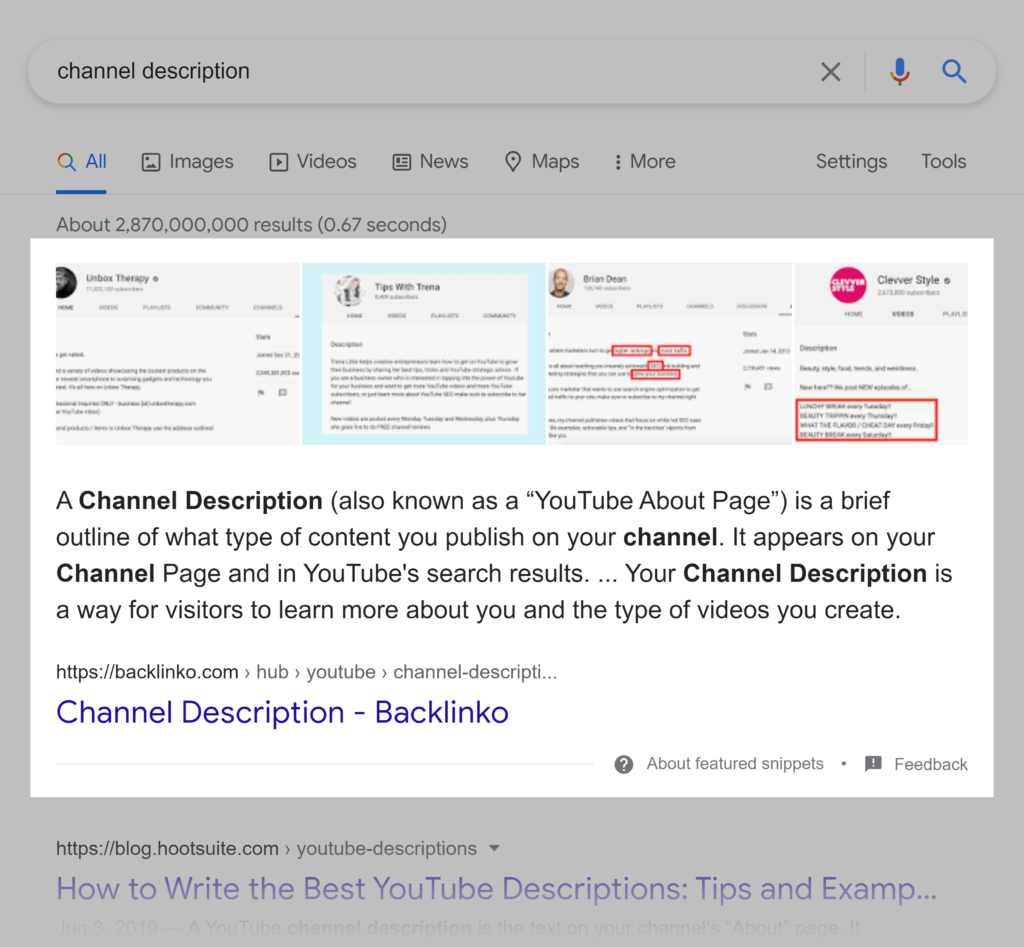
Third, the reading level of the answer is Grade 9, which is consistent with most other voice search results.
Finally, Backlinko’s domain name score is 85. This is higher than the average of 77 for voice search.

Similarly, the authority of the page does not seem to be important for voice search SEO.
The authority of this page is only 12. )

Let’s look at another example.
Case study # 2: “what’s the best way to peel garlic?”
The answer to this question comes from Lifehacker:

This is one of the situations where Google still provides you with 10 blue links.
But unlike a set of traditional search results, Google points you to a specific result by saying, “this is information from Lifehacker:”
So what helps this page rank in this voice search keyword?
First of all, Lifehacker is a super authoritative website (domain name rating is 91).
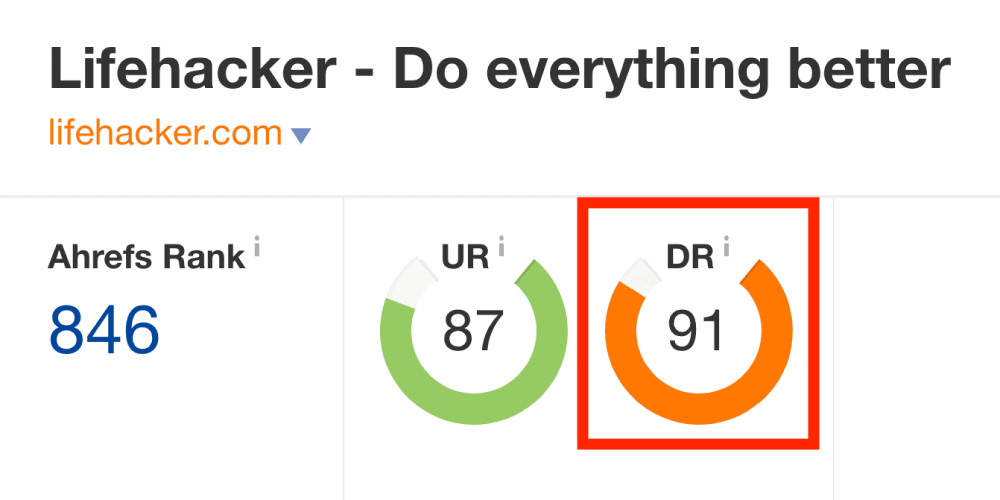
The page also loads very fast (the moving speed score from Google PageSpeed Insights is 97Universe 100).
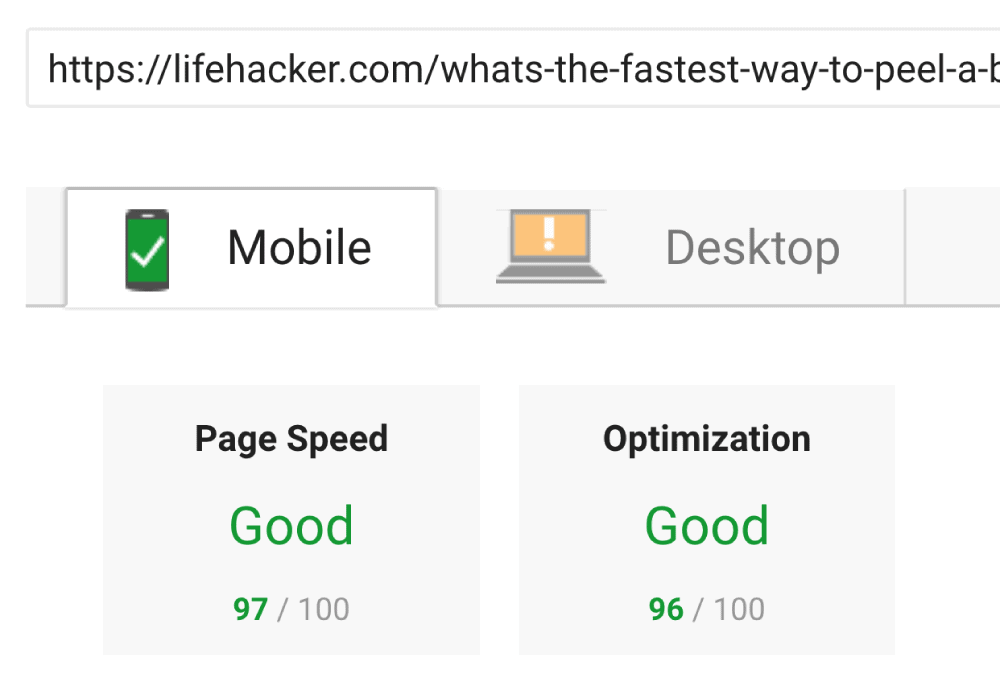
The answers are also written in an easy-to-understand way (at the seventh grade reading level).
Finally, the answer is in selected clips, which increases the chances of voice search rankings:
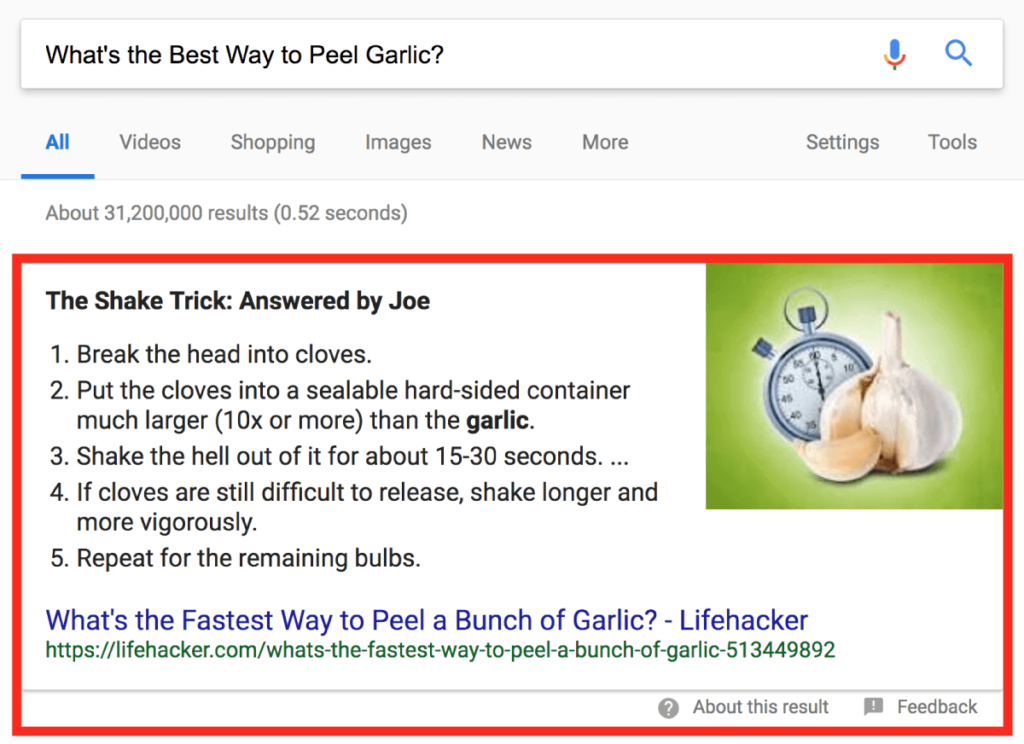
Let’s summarize it with a final mini case study.
Case study # 3: “how do you access the Google keyword planner?”
Not long ago, the following article focused on how to make the most of the Google keyword planner.
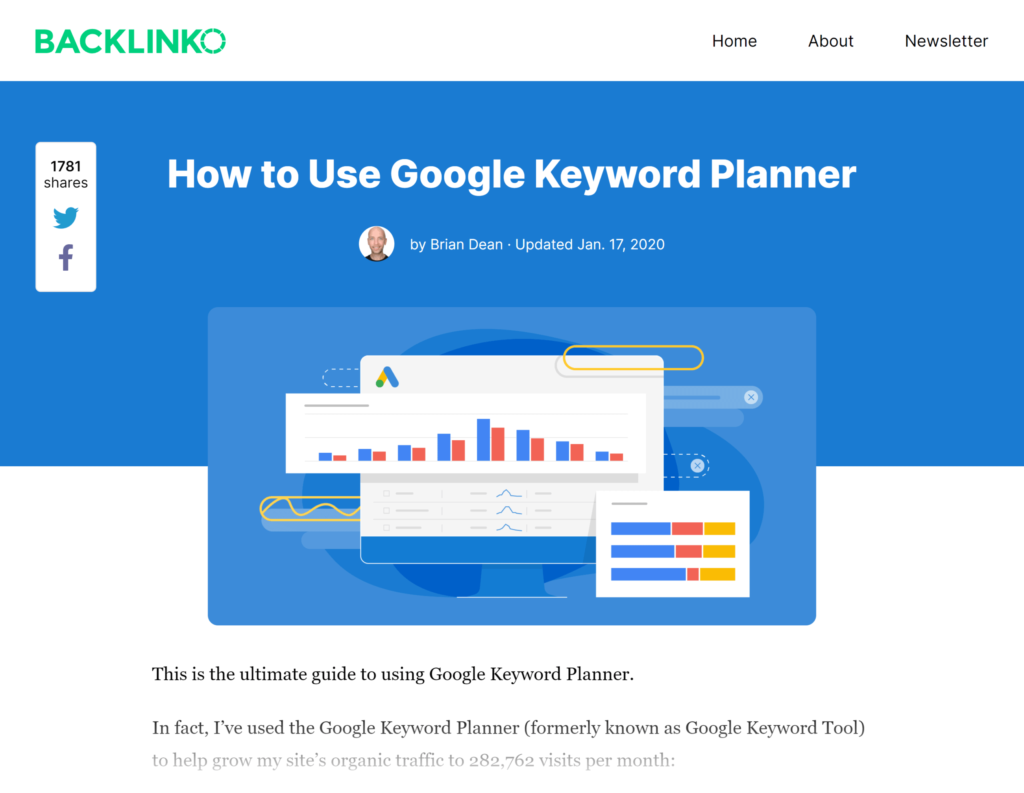
Specifically, I’ve added a bunch of clips that can be used well as selected clips or voice search results.
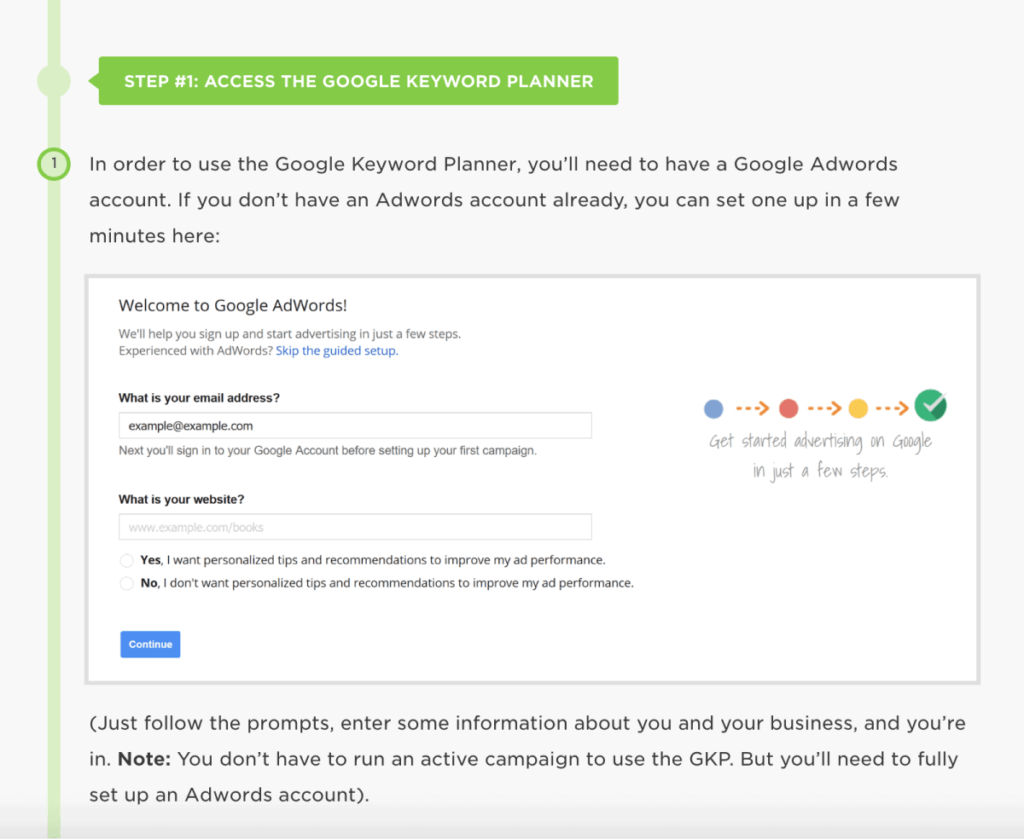
Sure enough, when you do a voice search, my page “ranking” # 1: “how do you access the Google keyword planner”.

Let’s break it down:
First, Backlinko has a domain name rating of 85. This will definitely help.
But links are not as important as format and language.
(after all, three of the other 10 results on the first page come from Google.com. )
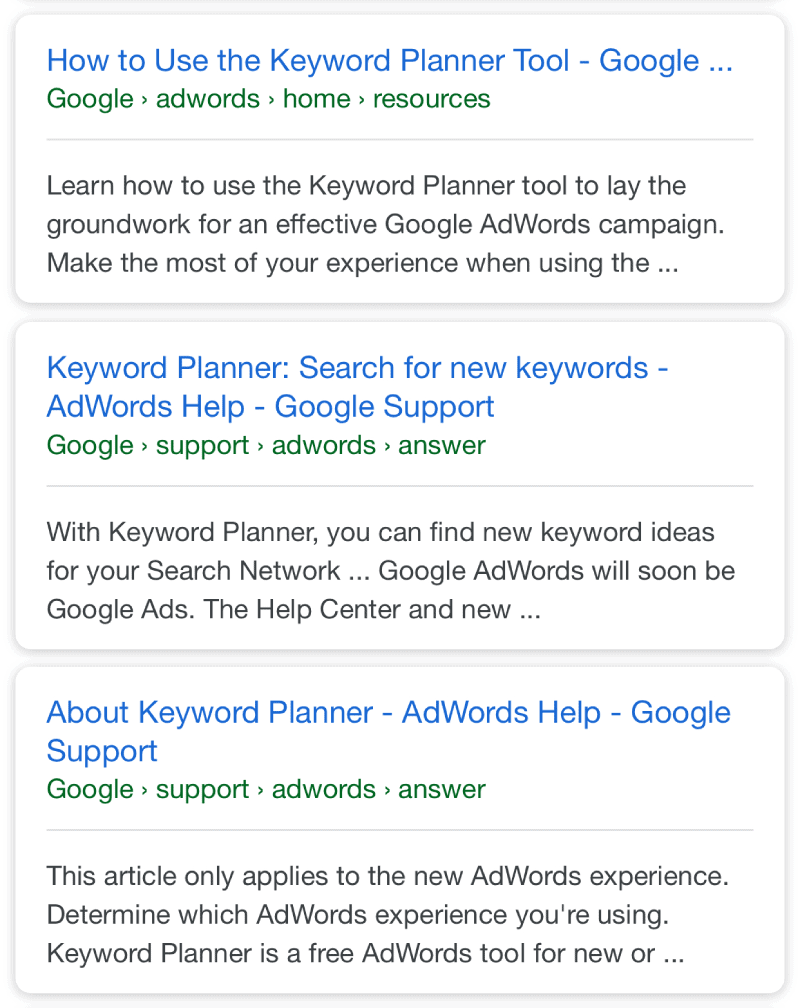
Second, even if the guide is about technical topics, it is easy for me to understand:
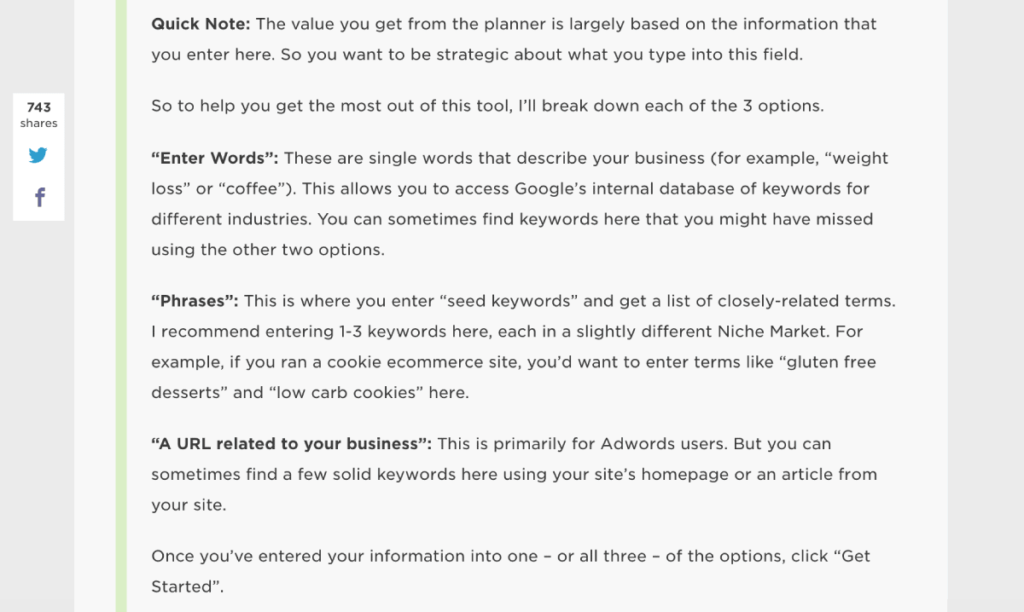
This is how I explain the Google keyword planner to my untechnical mother. )
In fact, the page was written at the level of eighth grade reading.
Finally, the number of words on the page is 2497 words.

The average voice search result is about 2300 words. So my content is very close to the “ideal” length of voice search SEO.
Summary
If you are going to face voice search, you hope to get more traffic in voice search in the future. Read the different technologies mentioned in the above guide, locate more question keywords and post FAQ pages.

